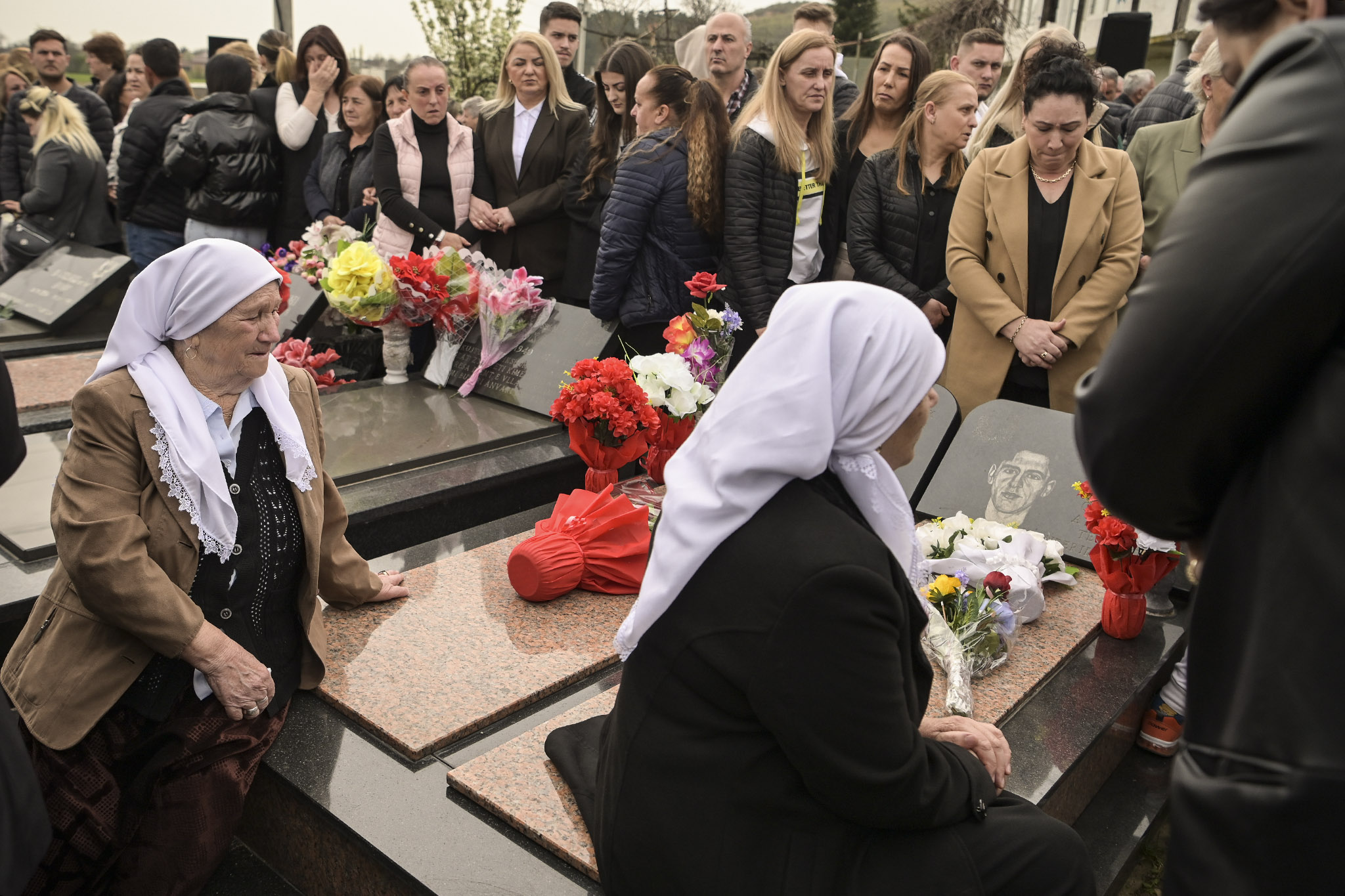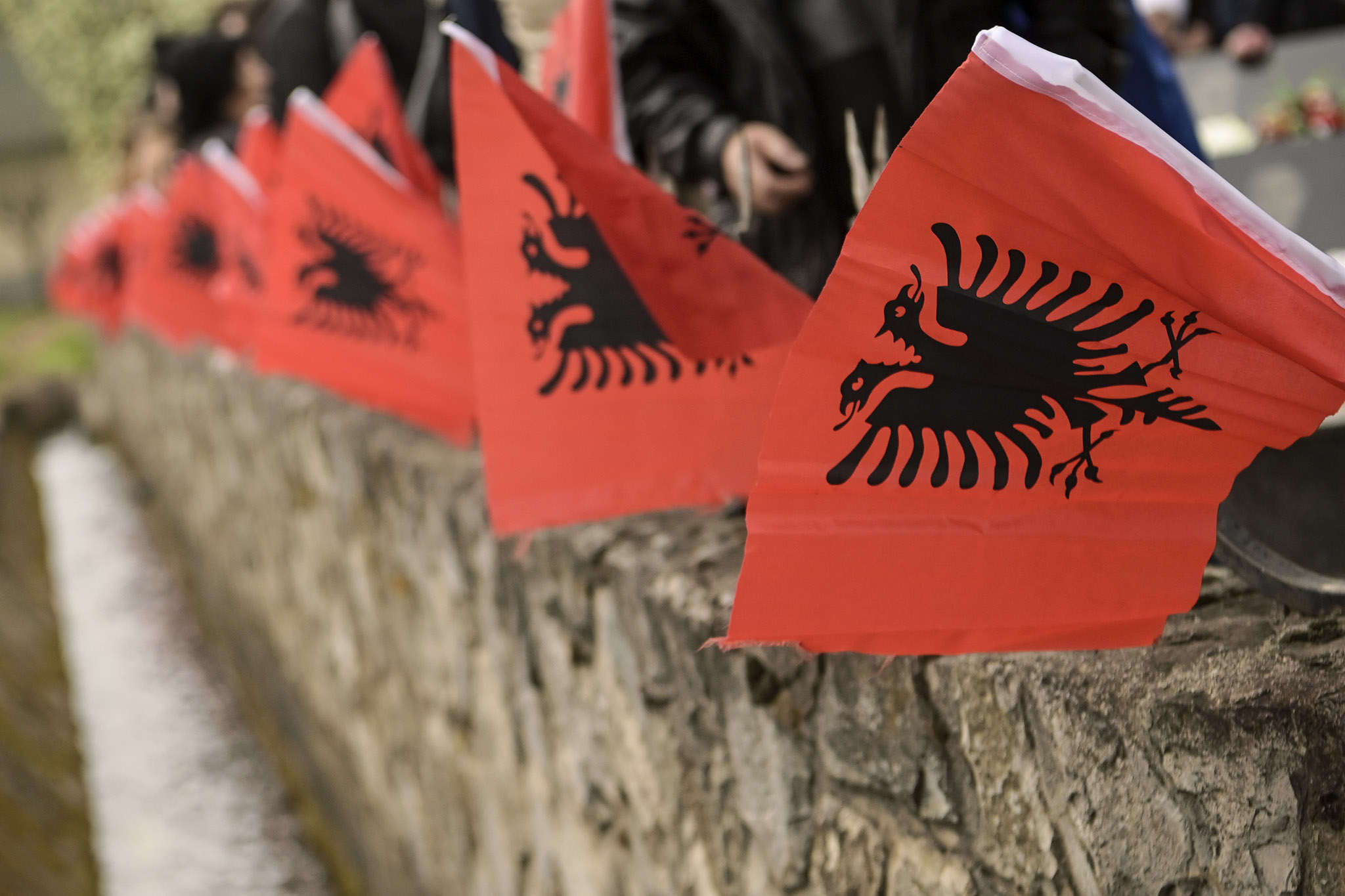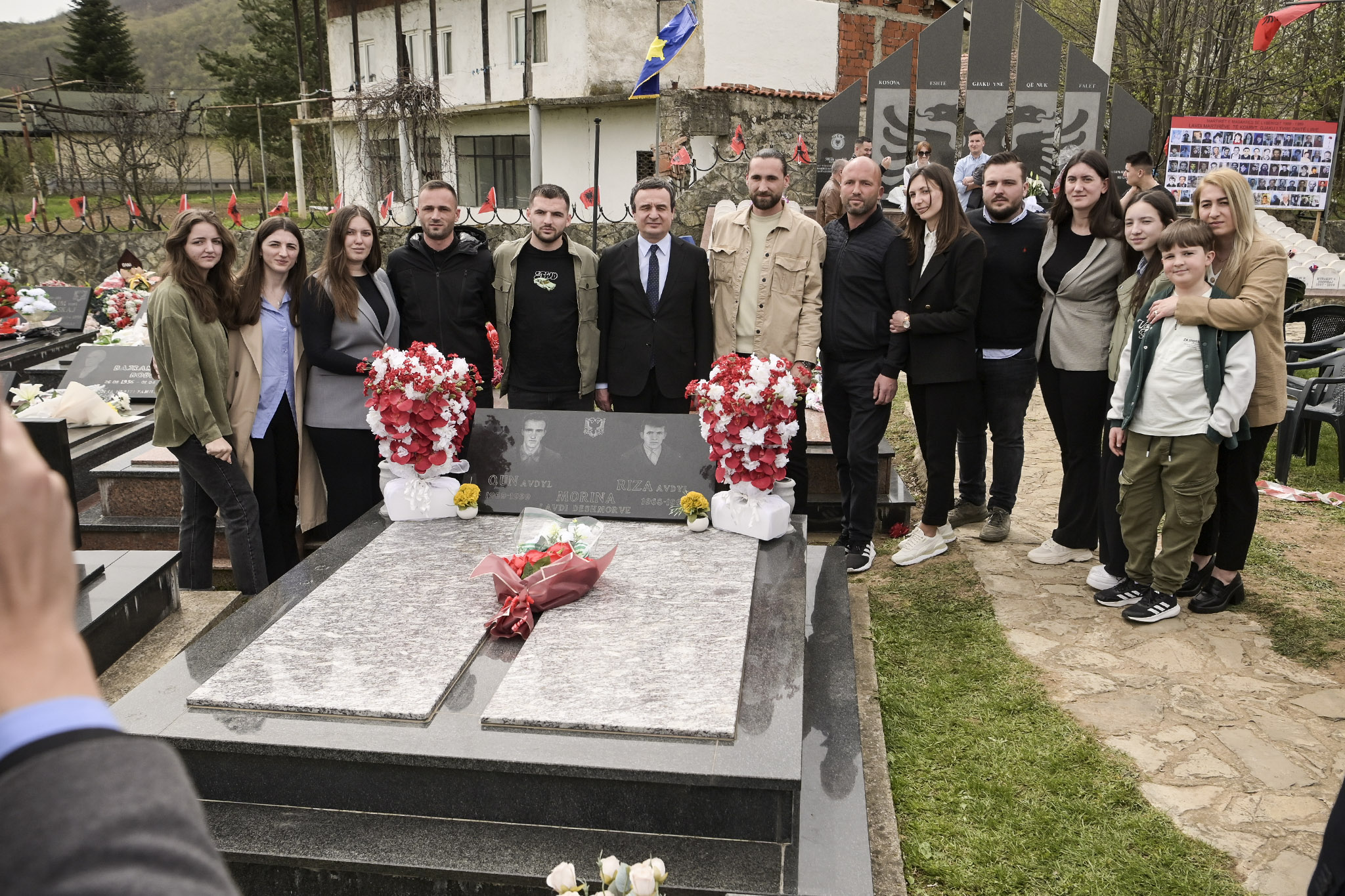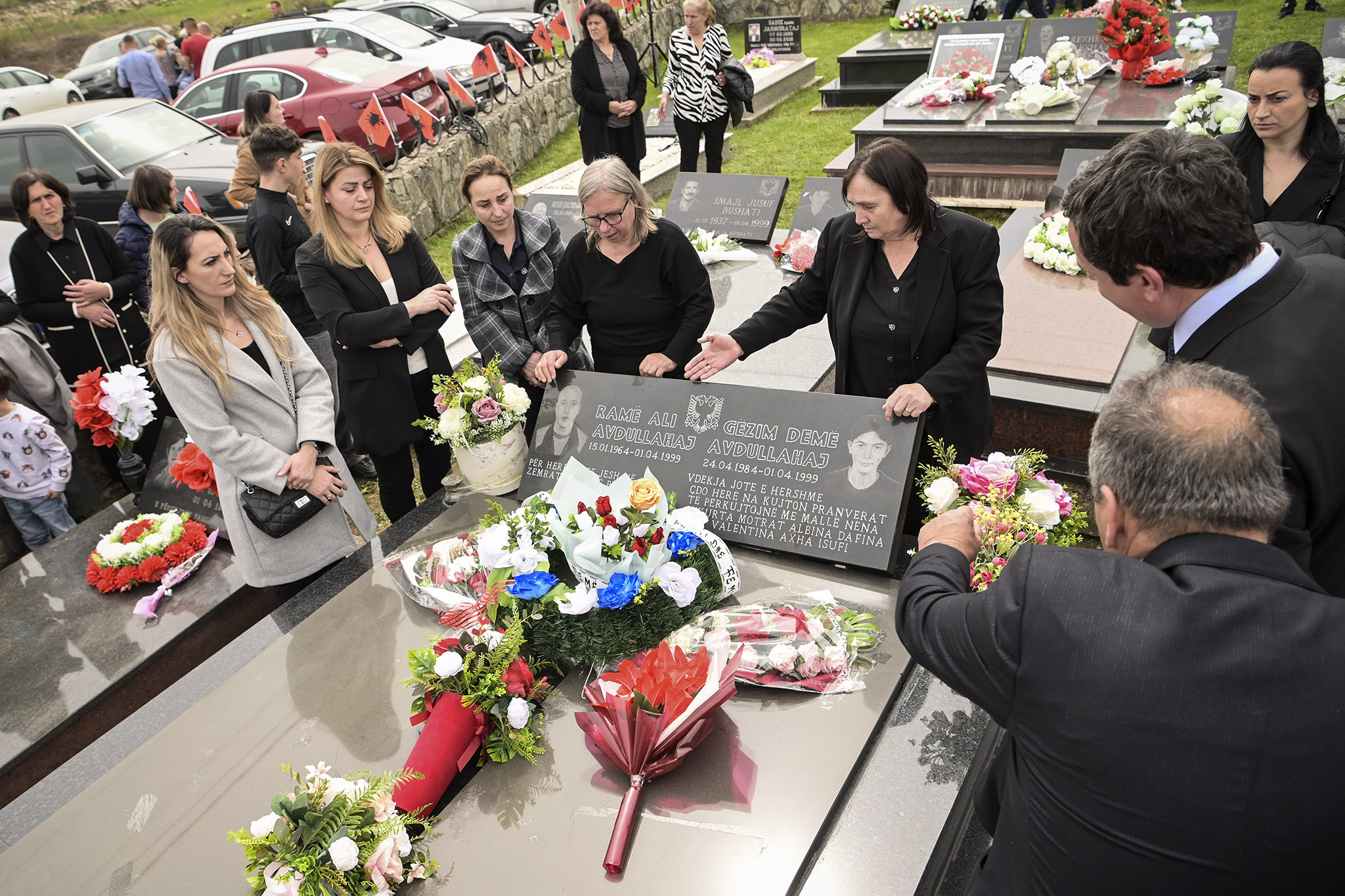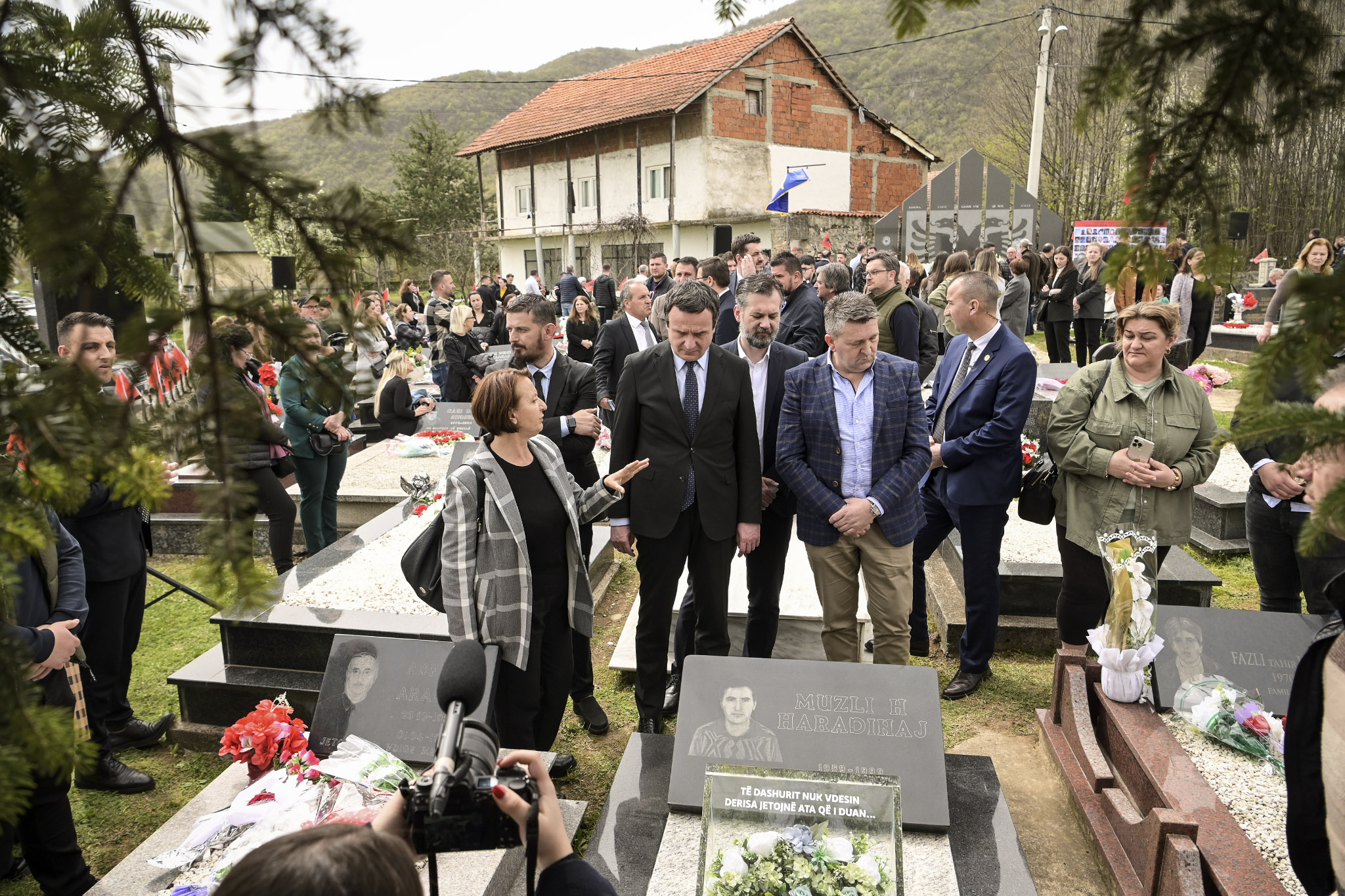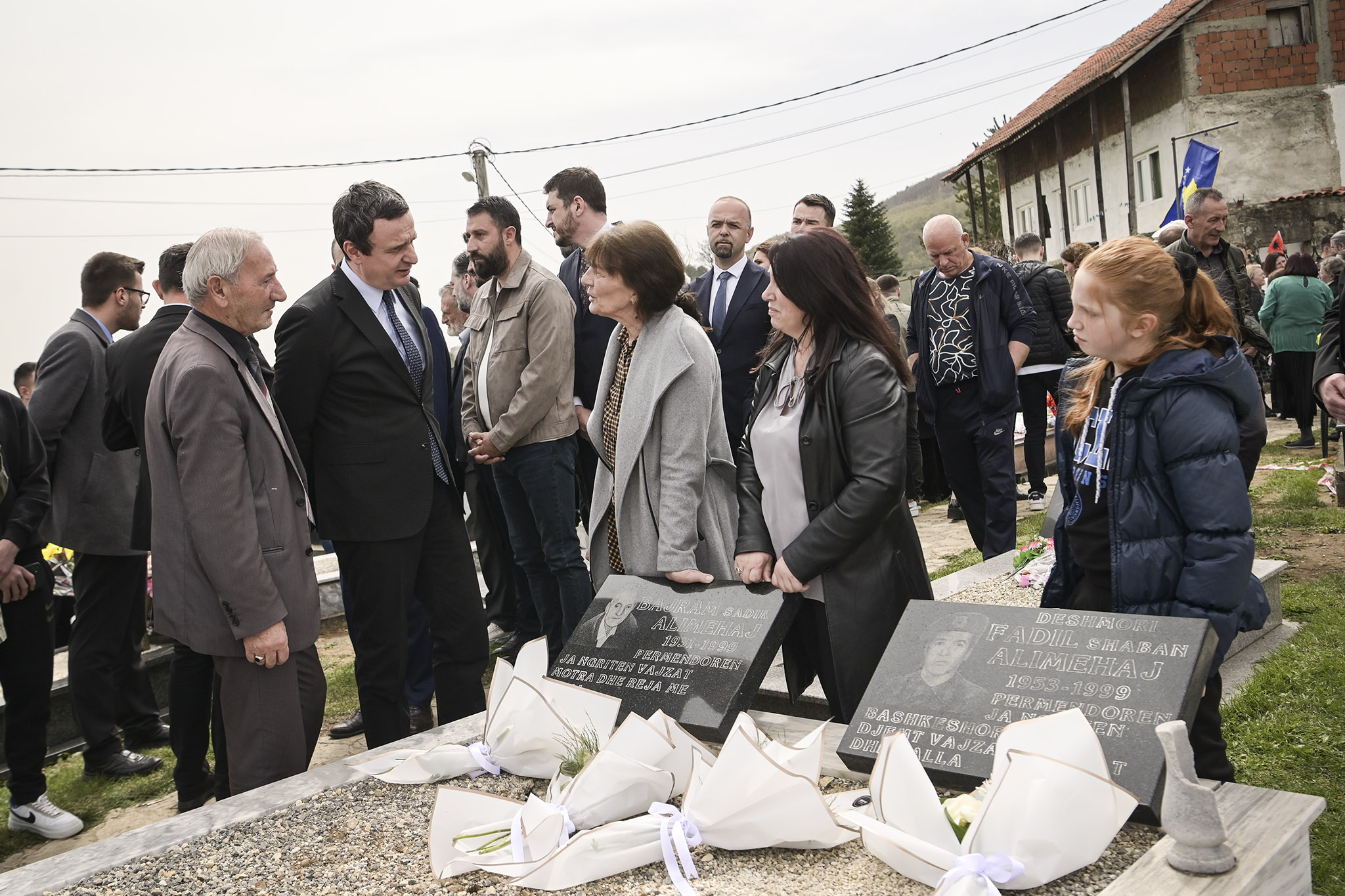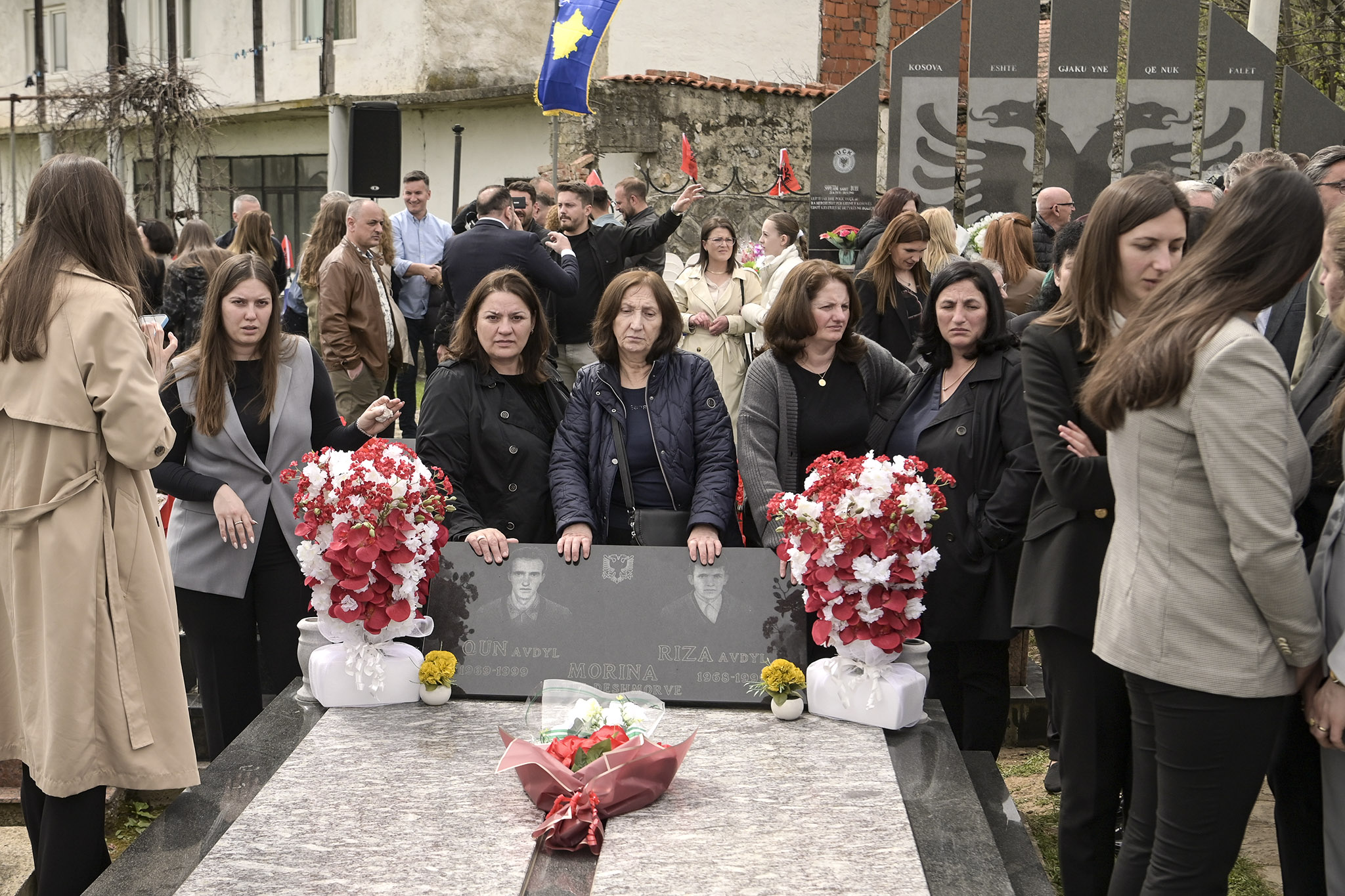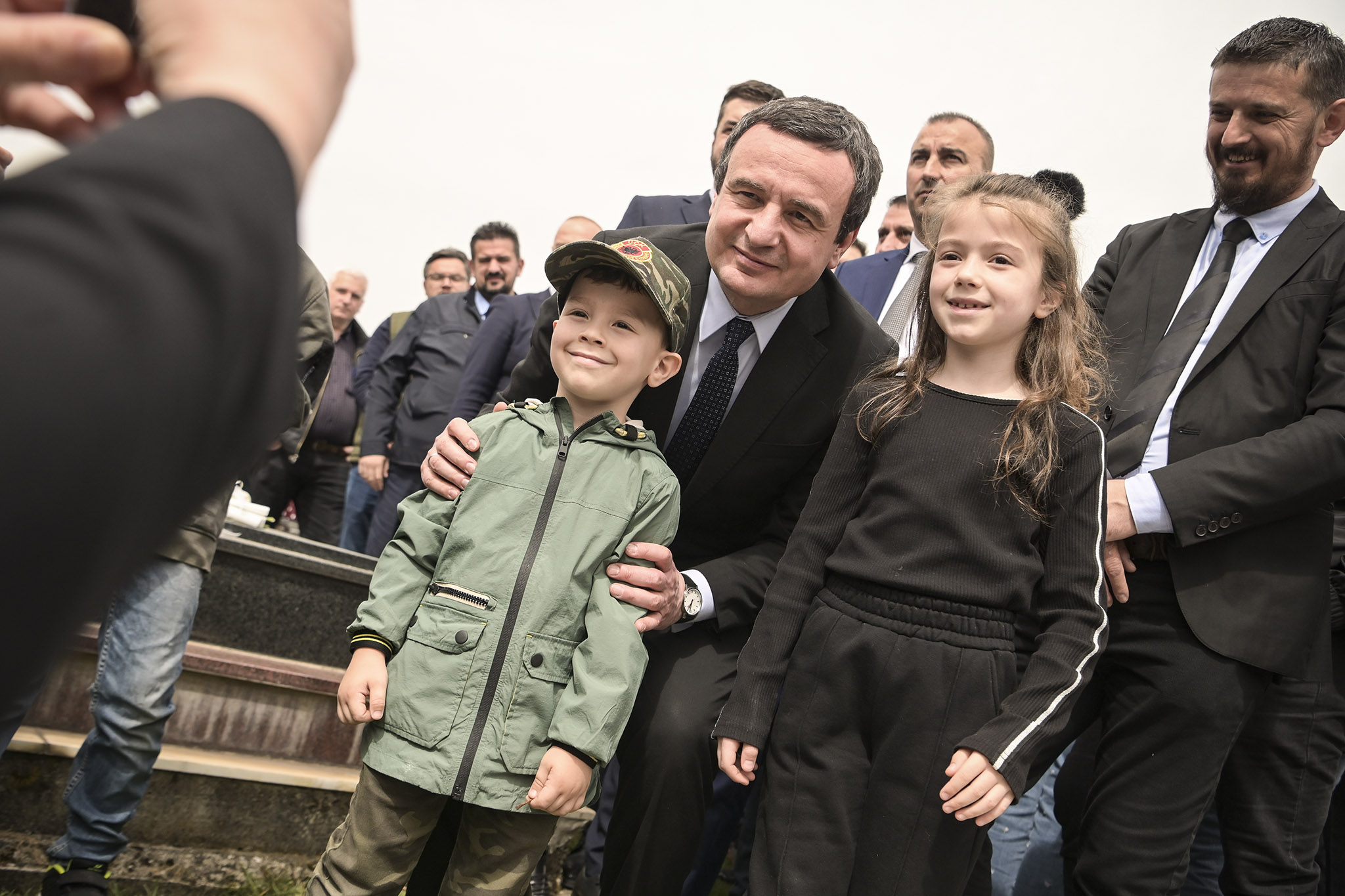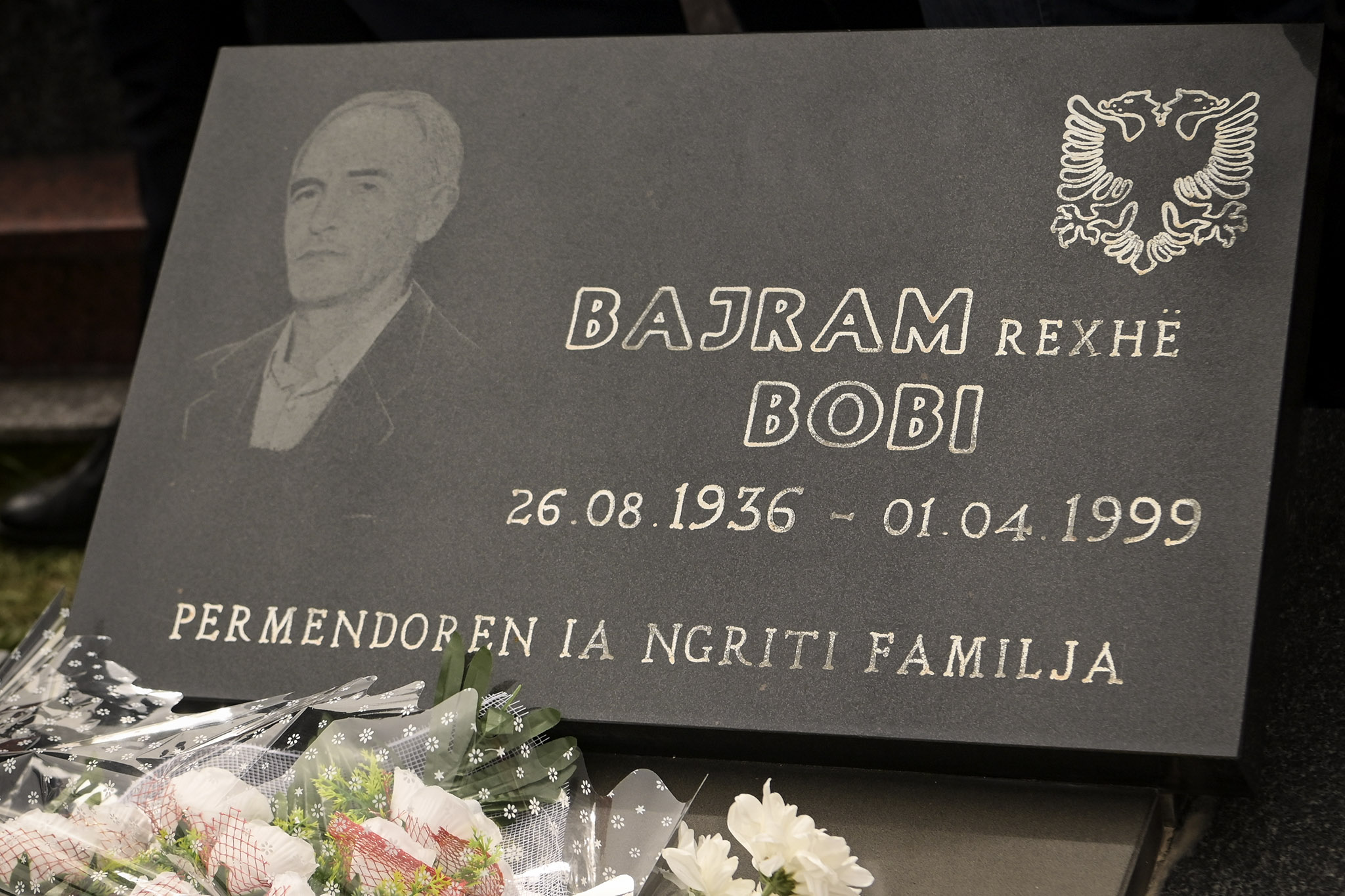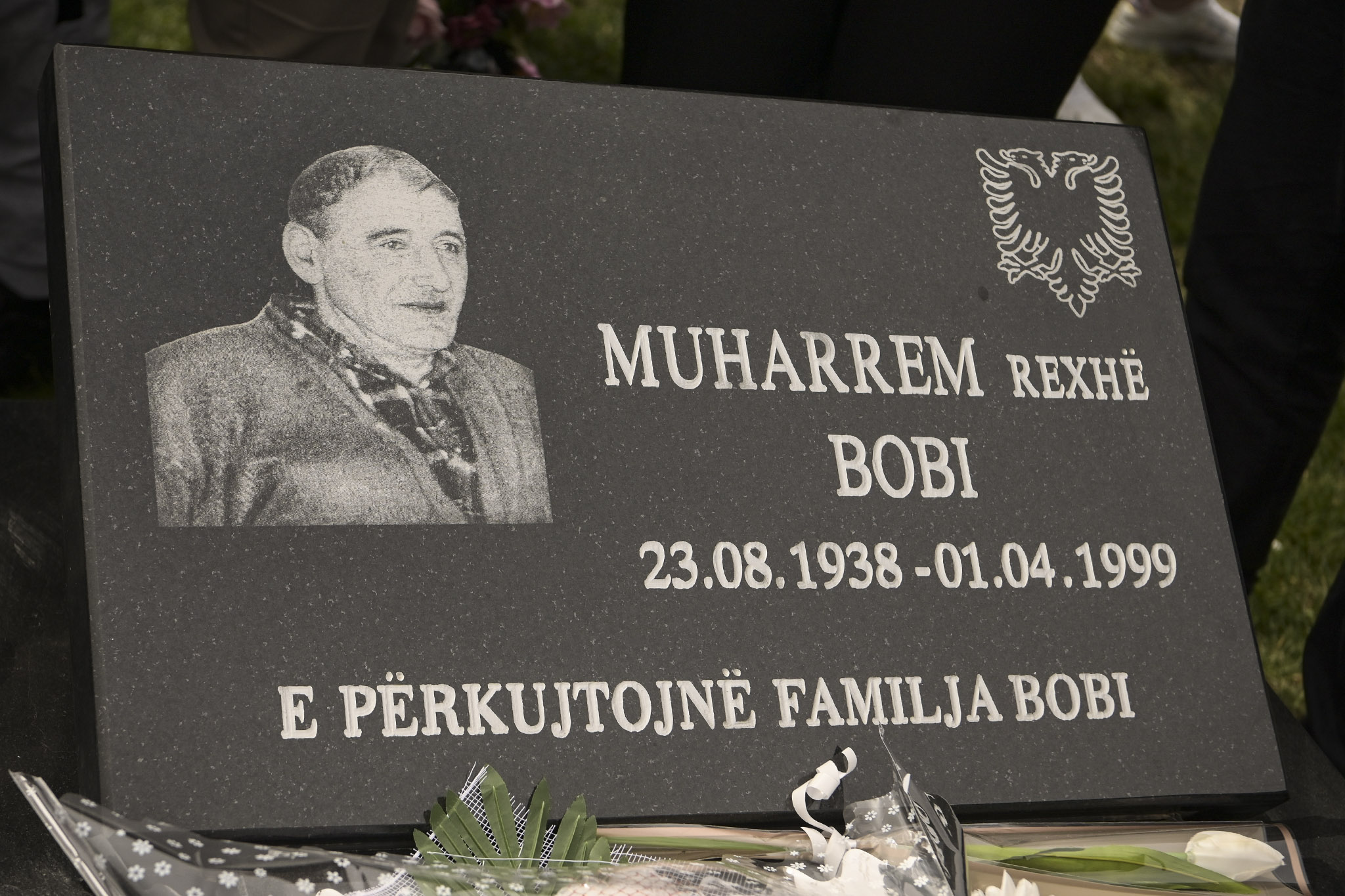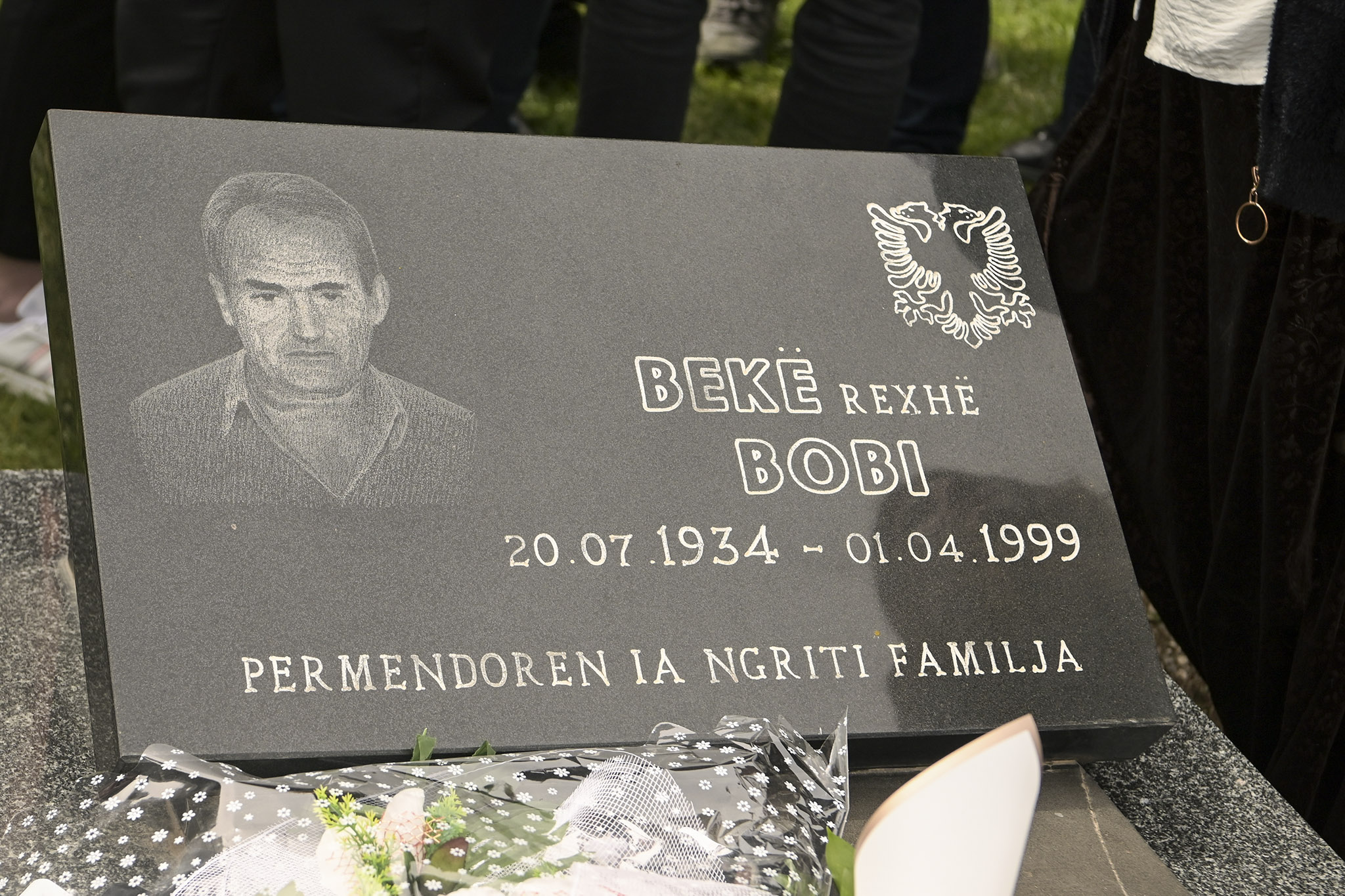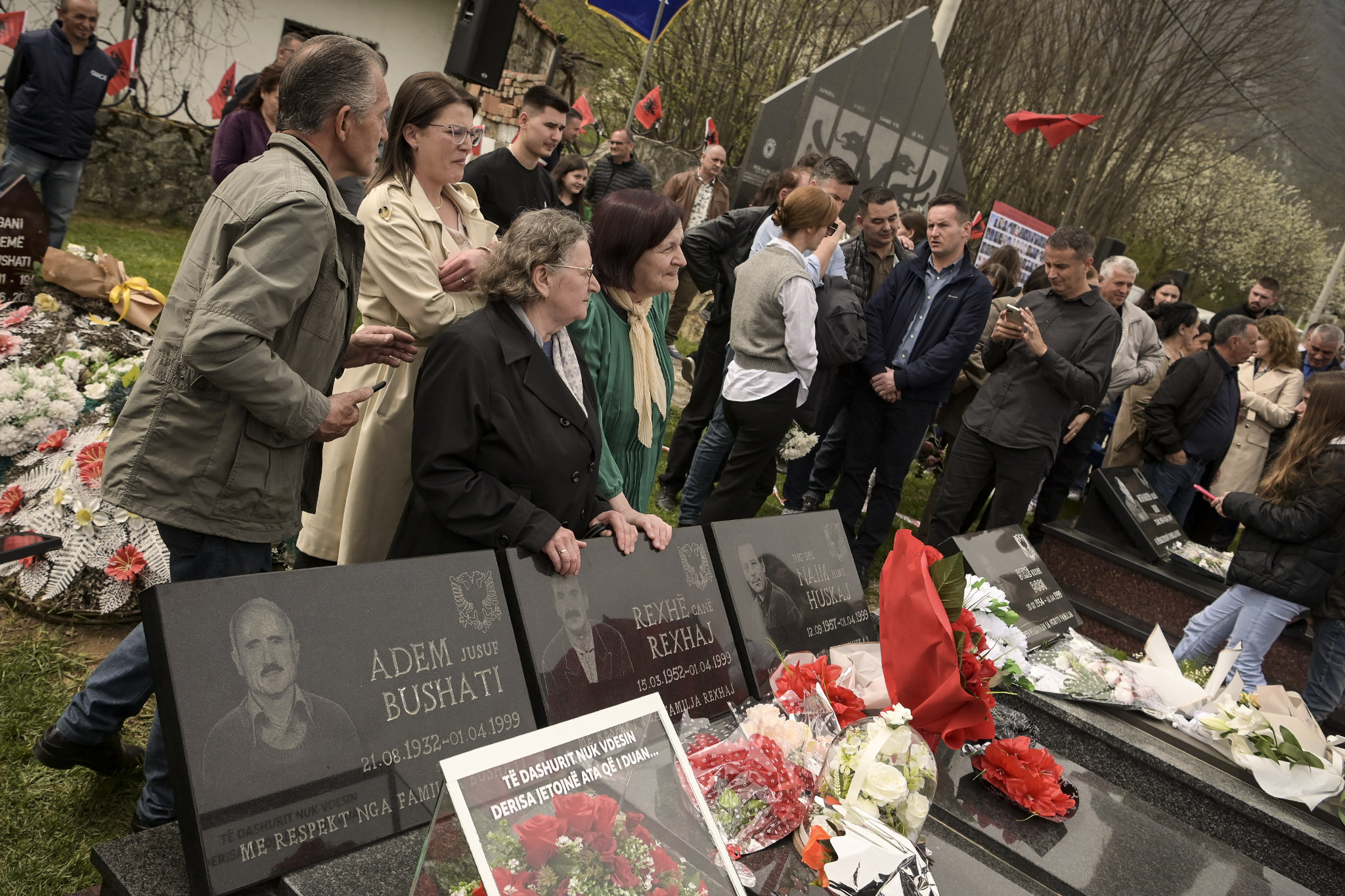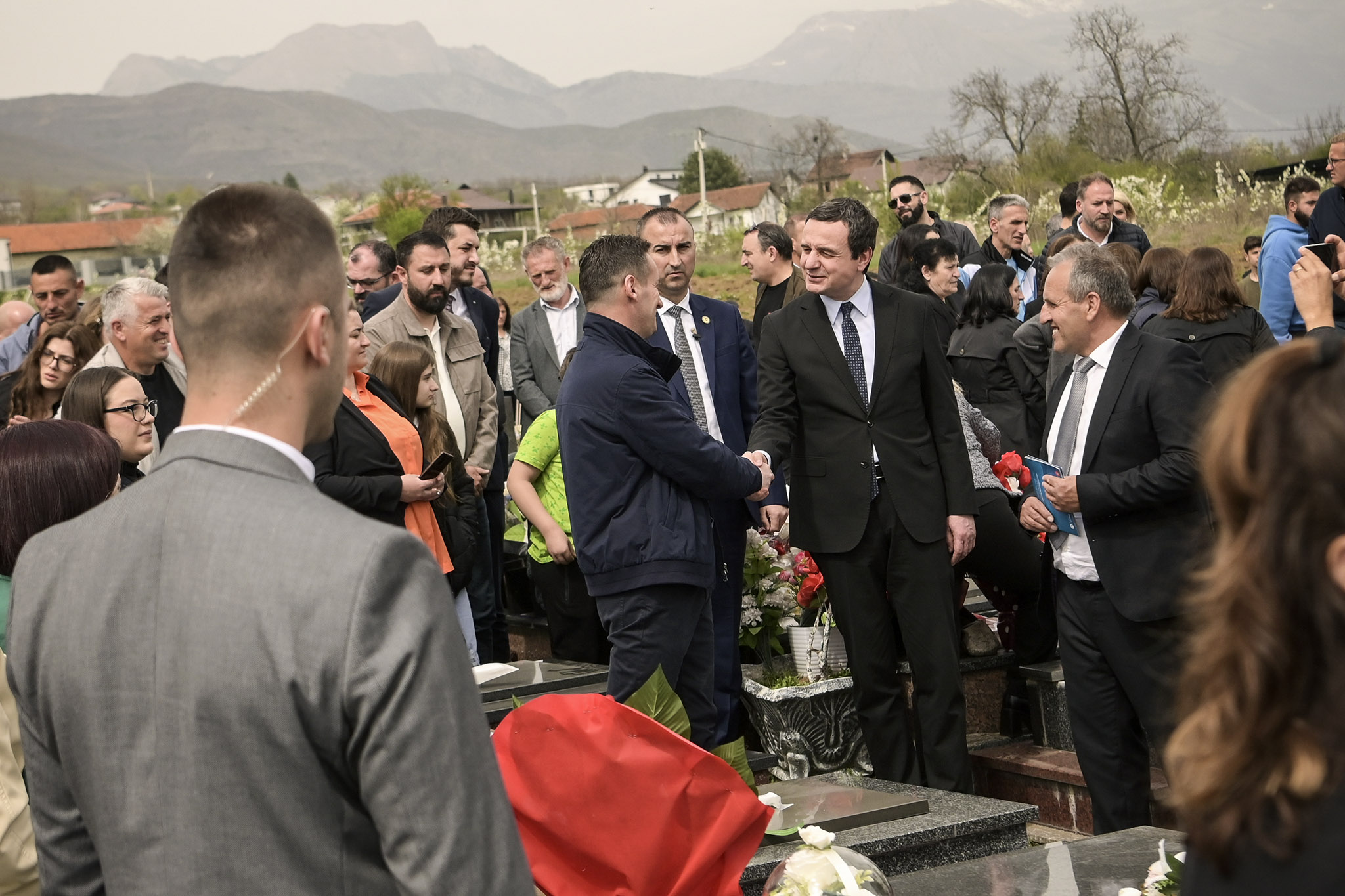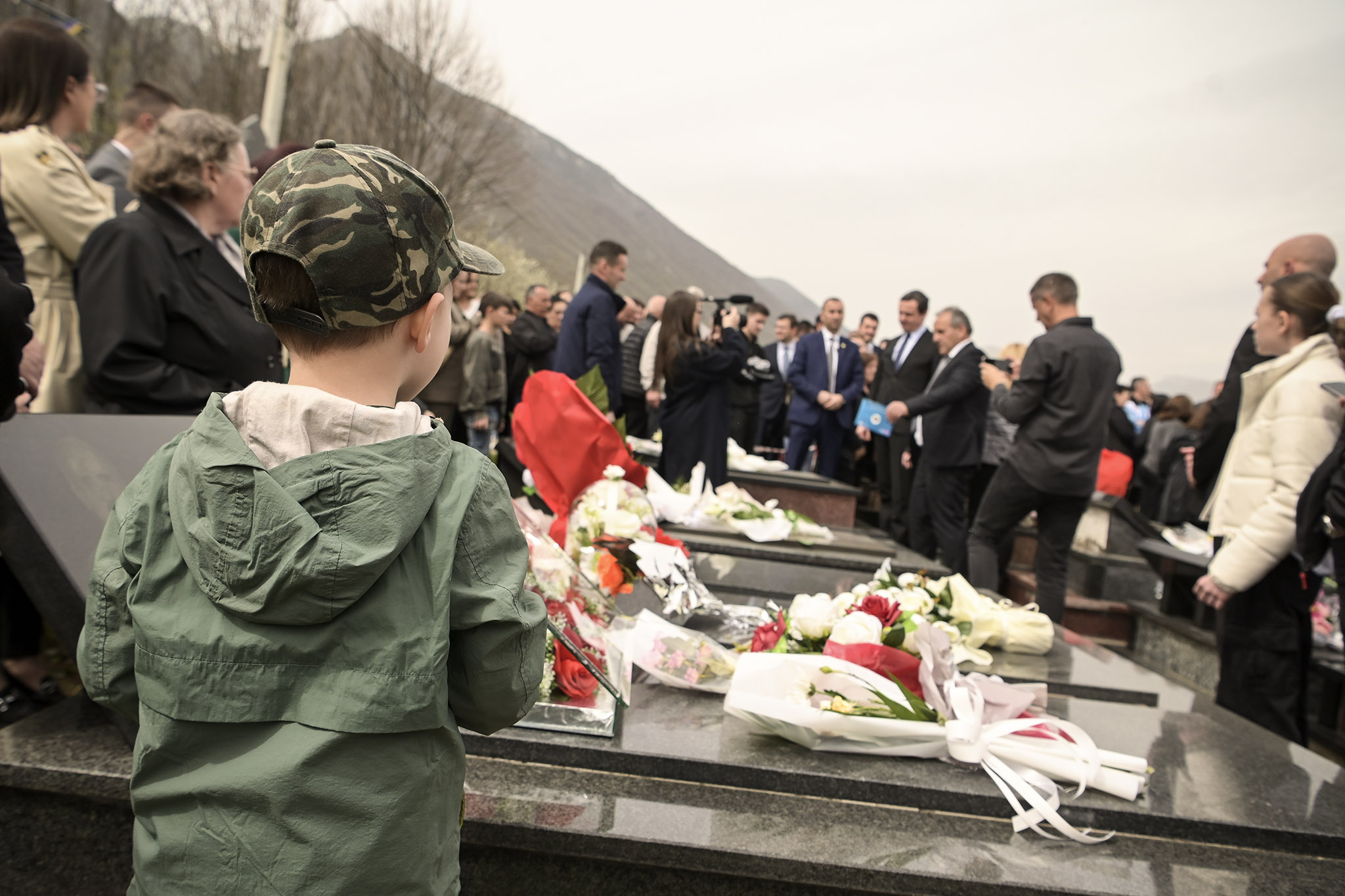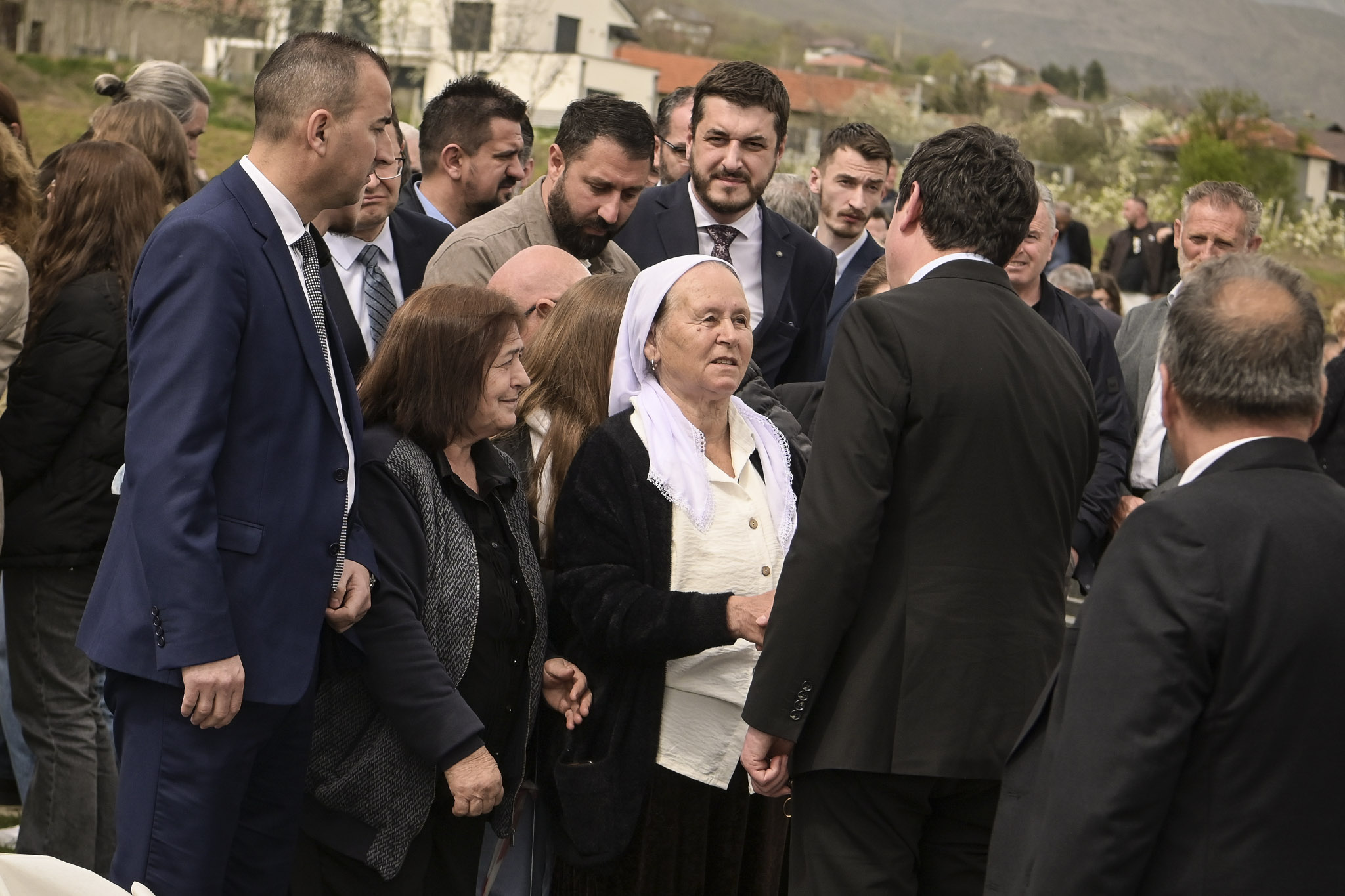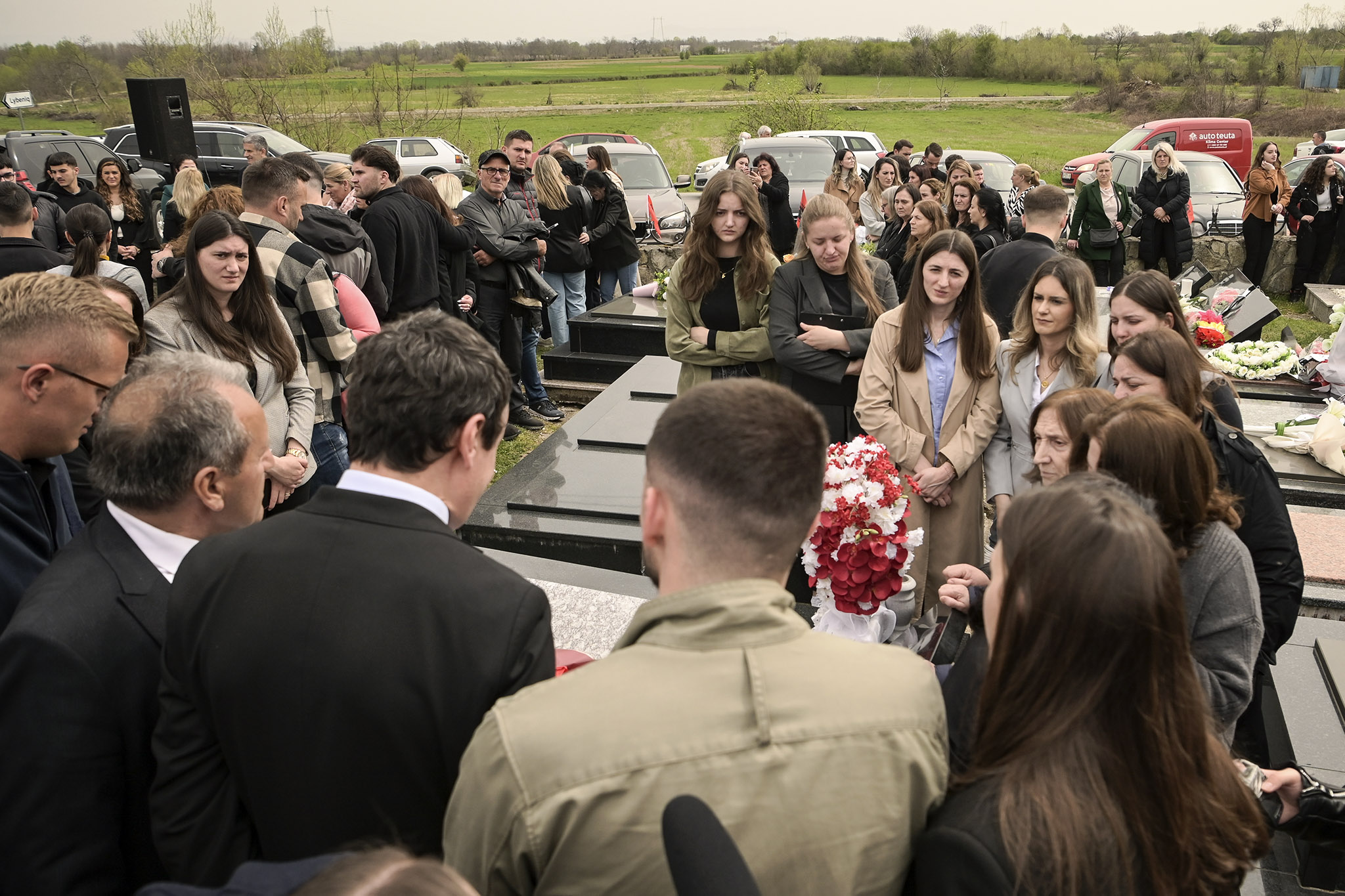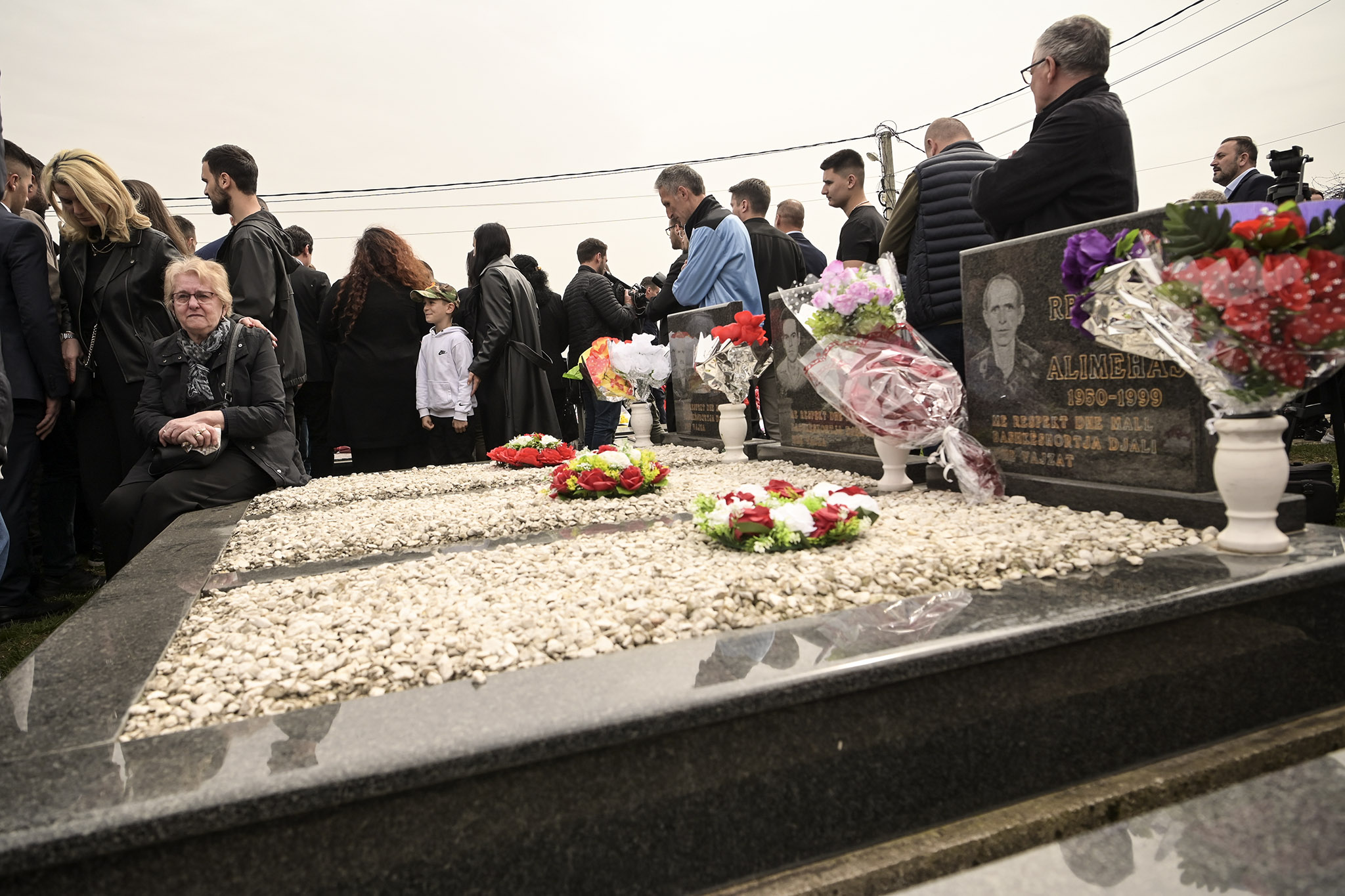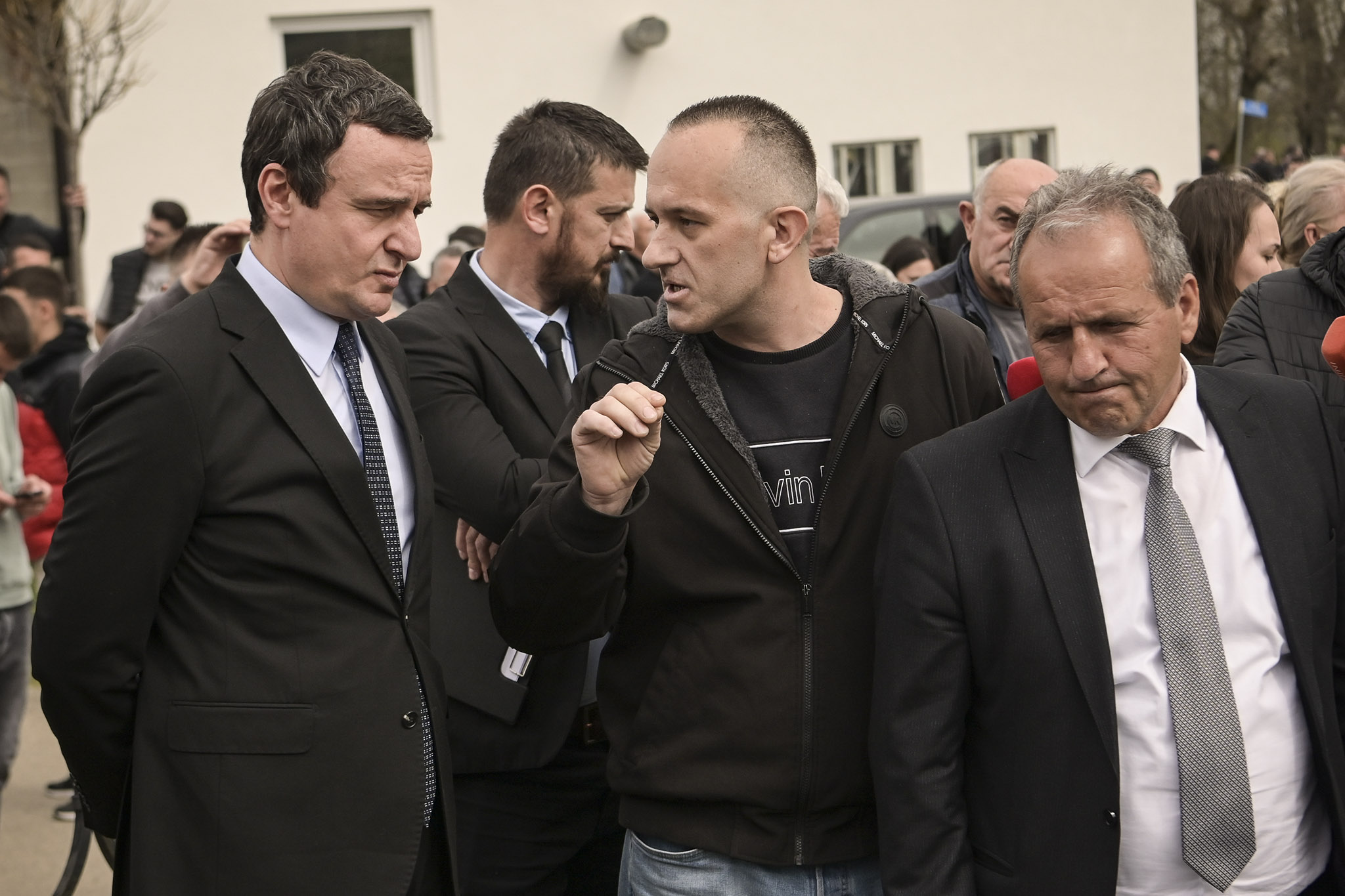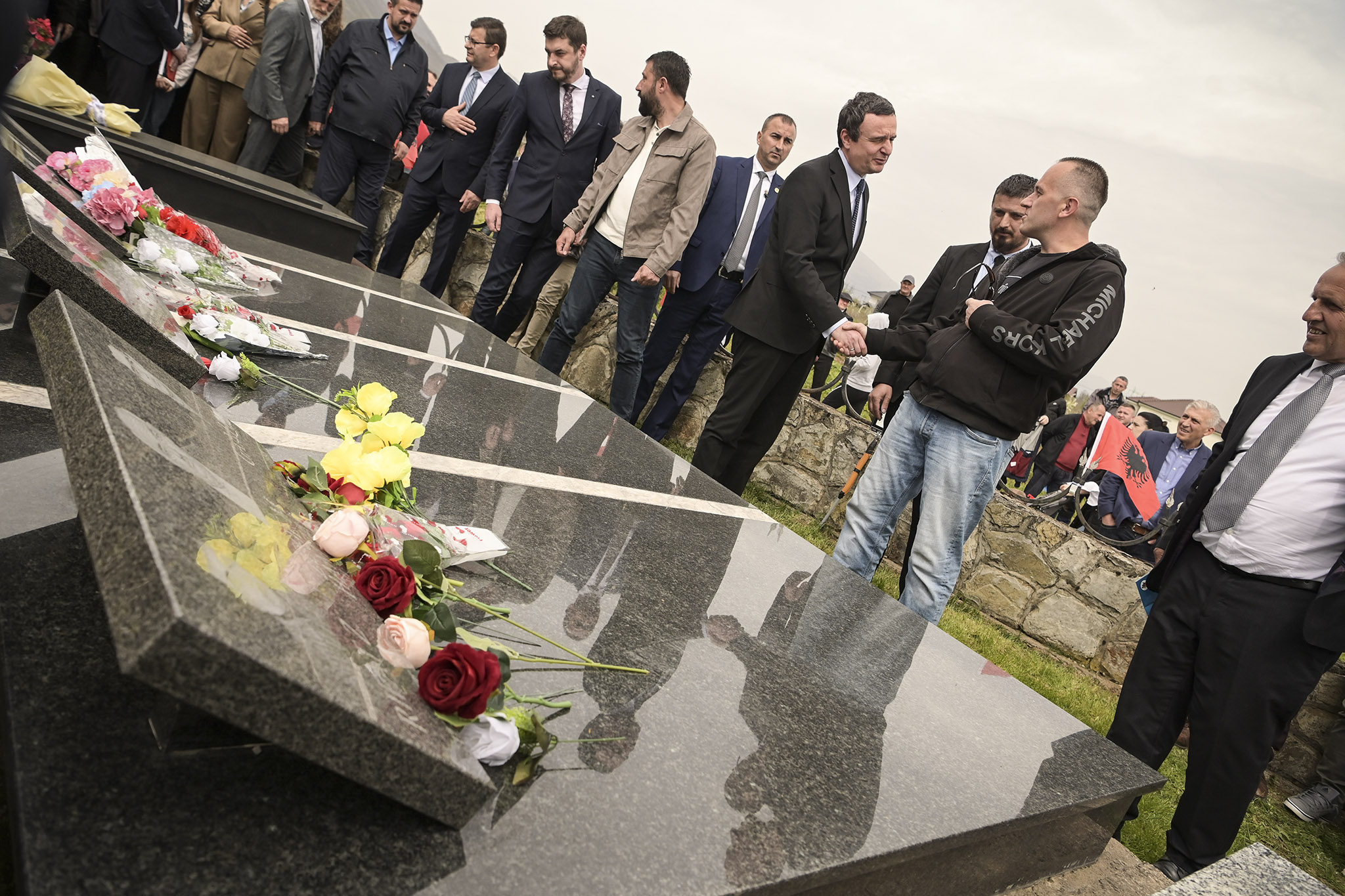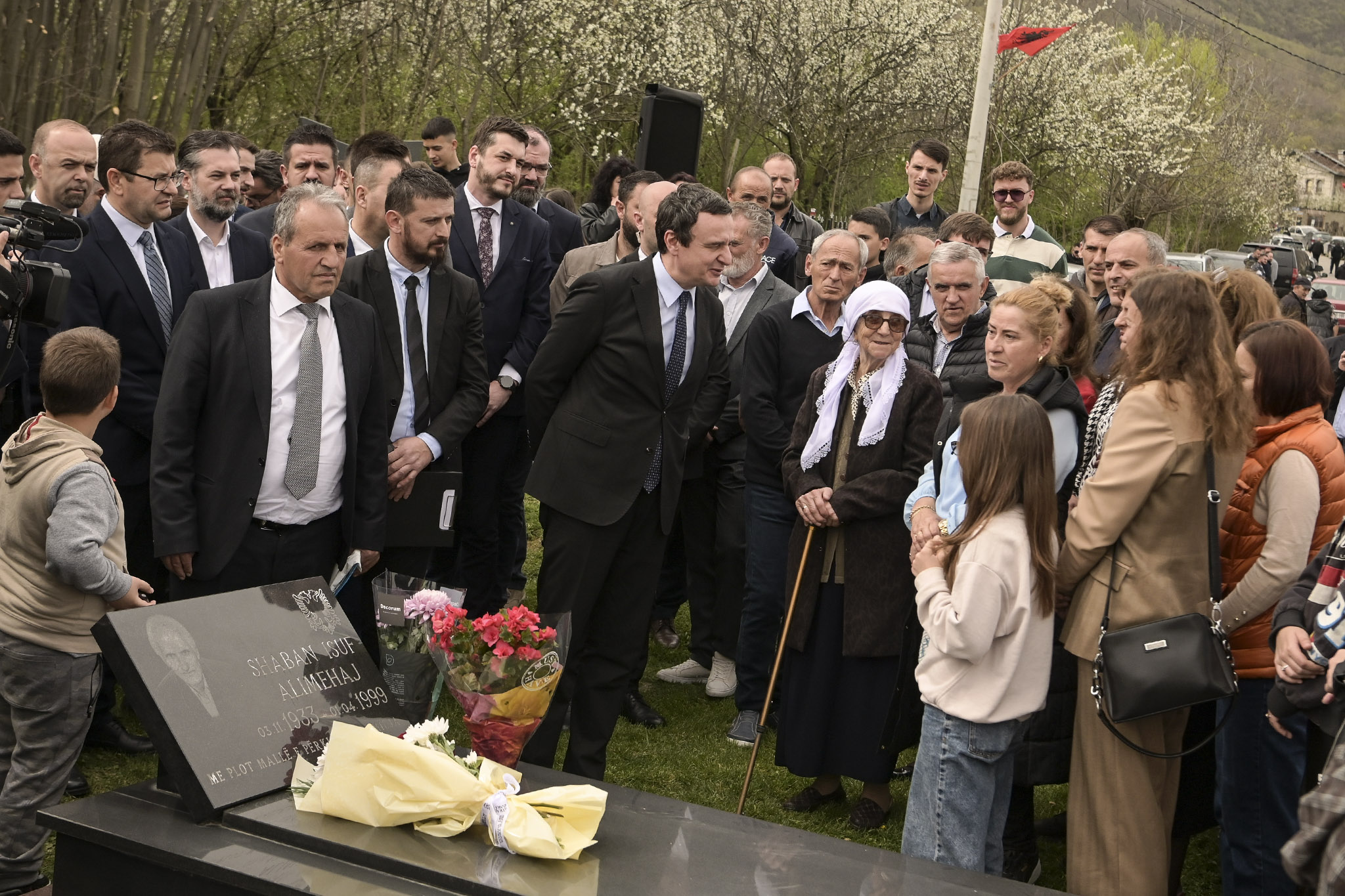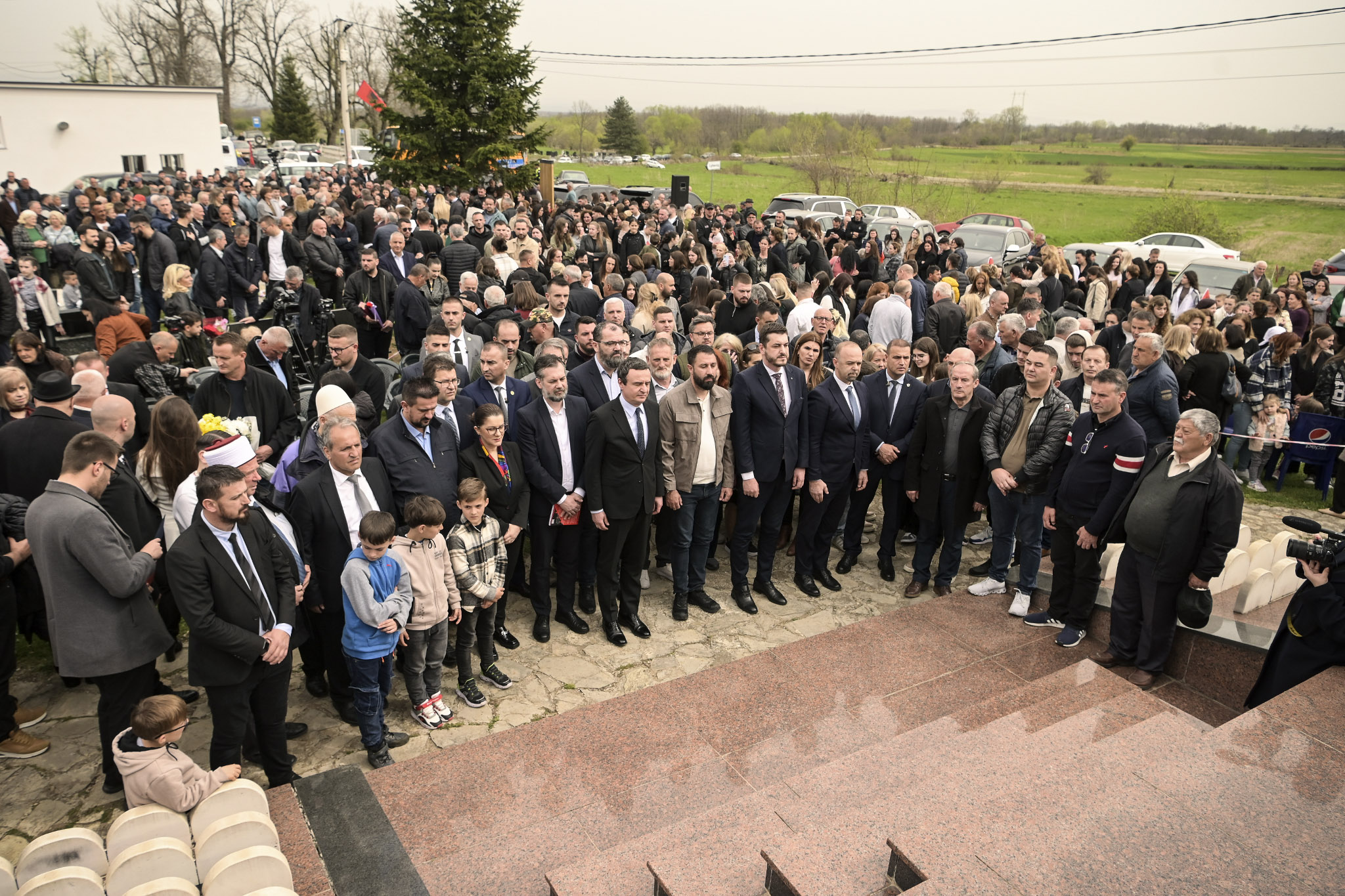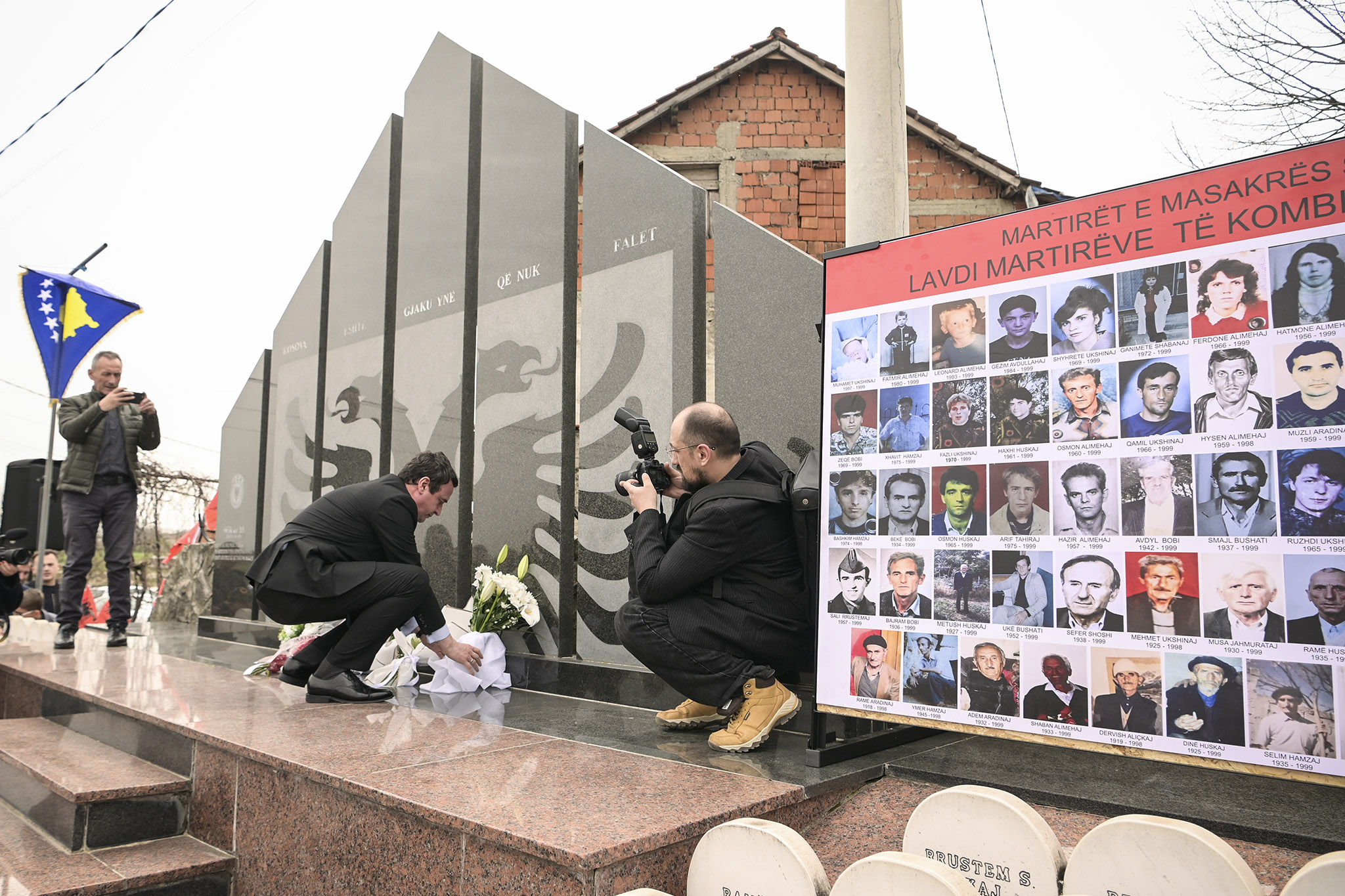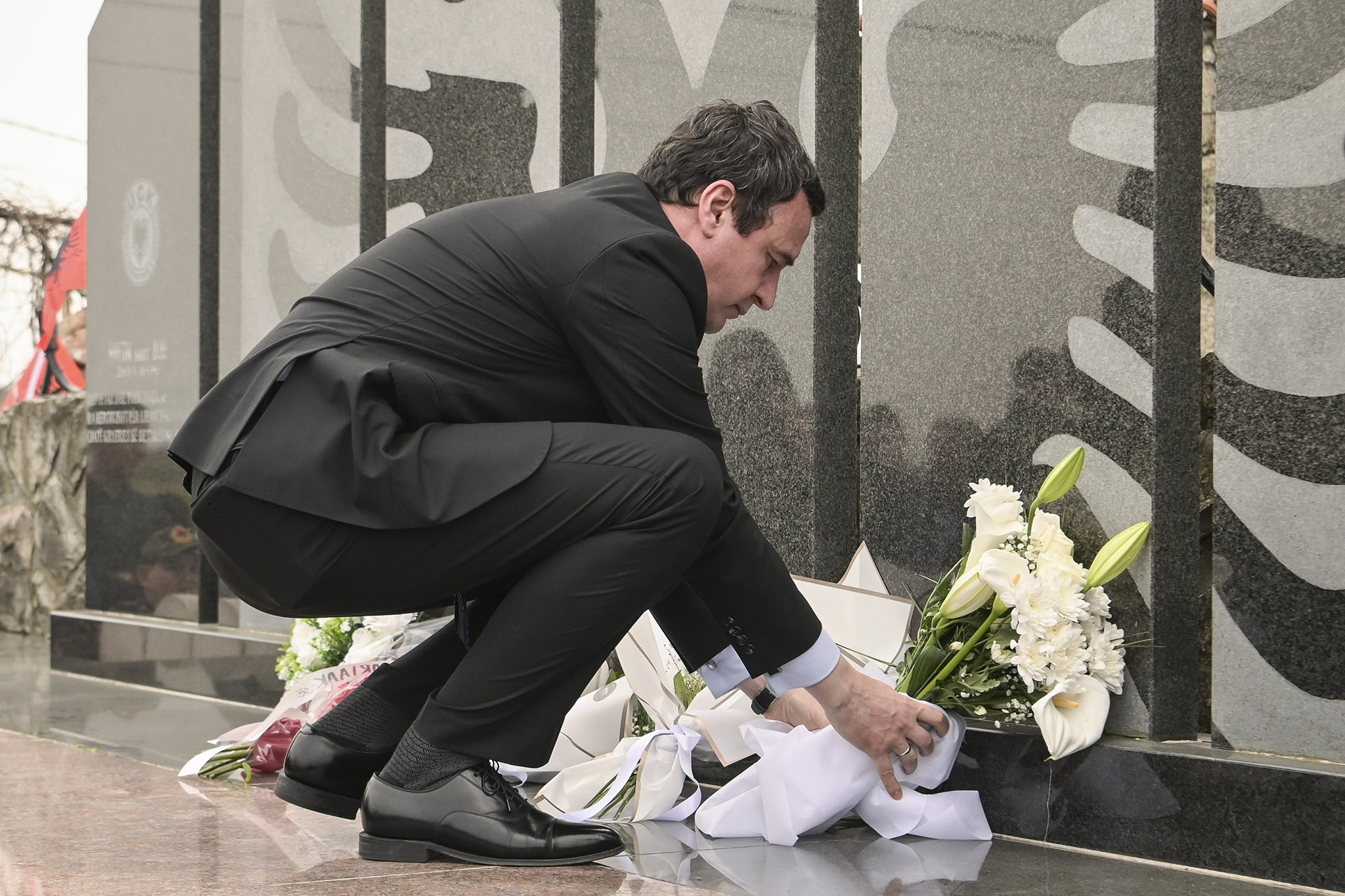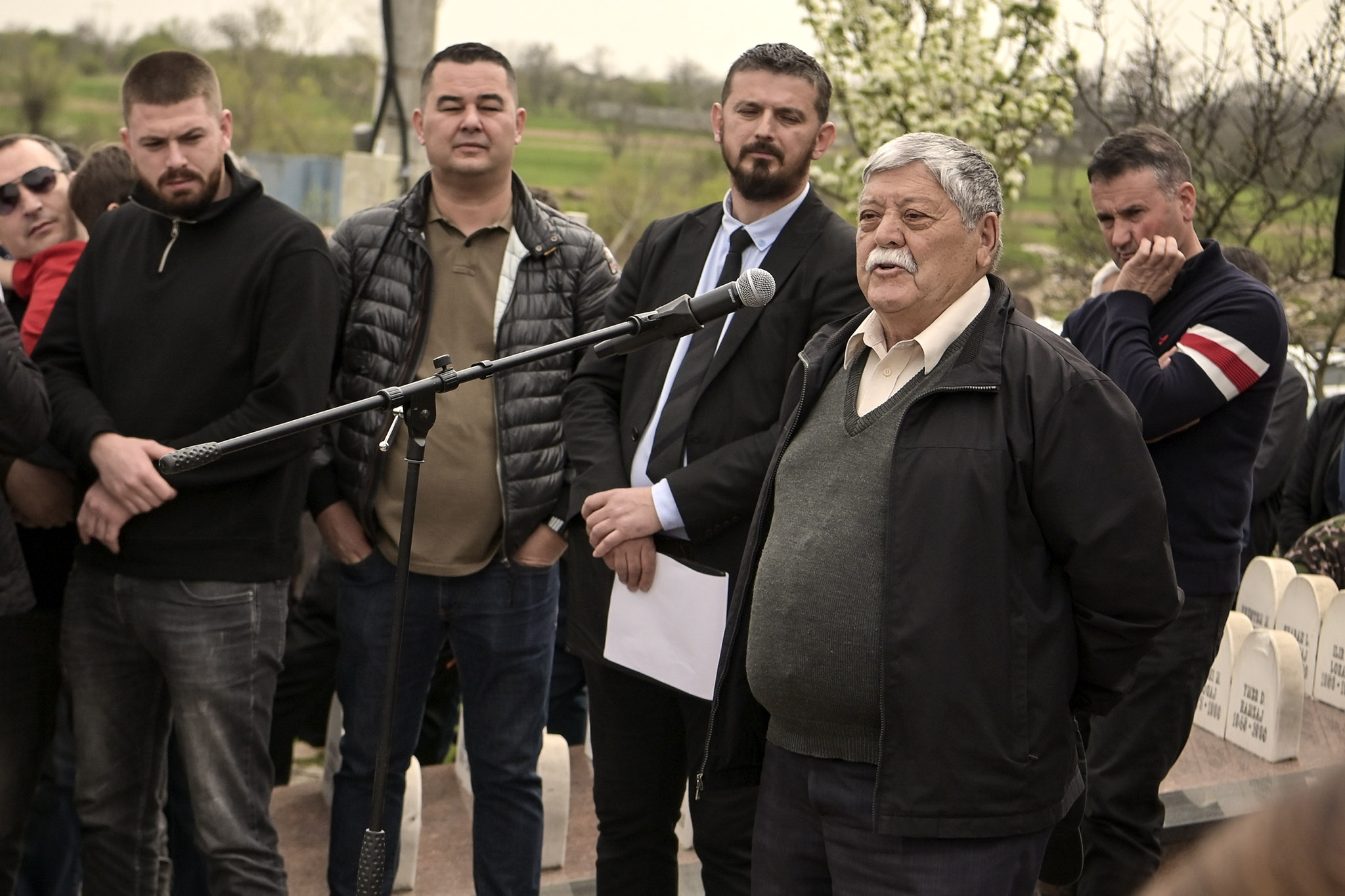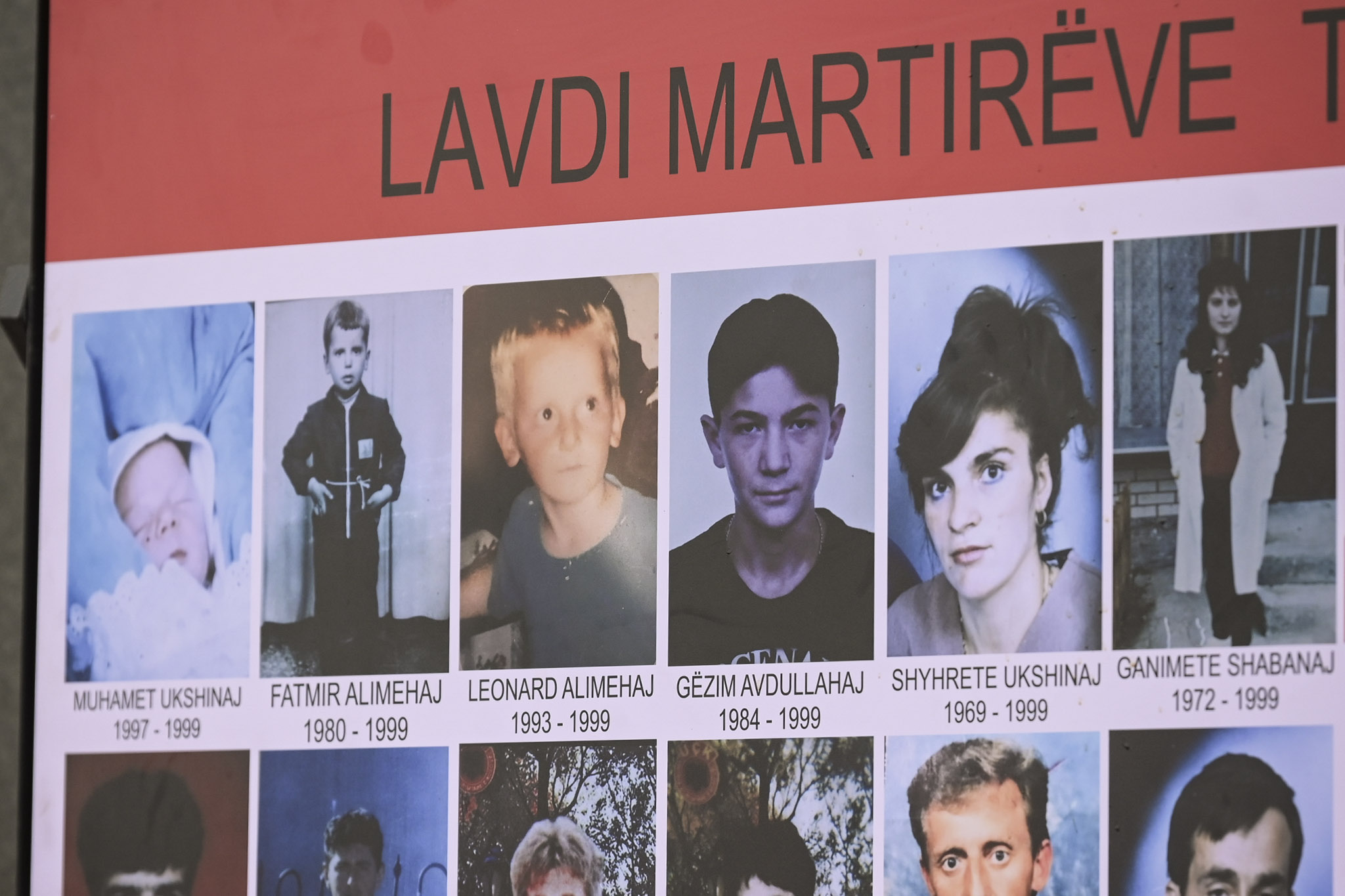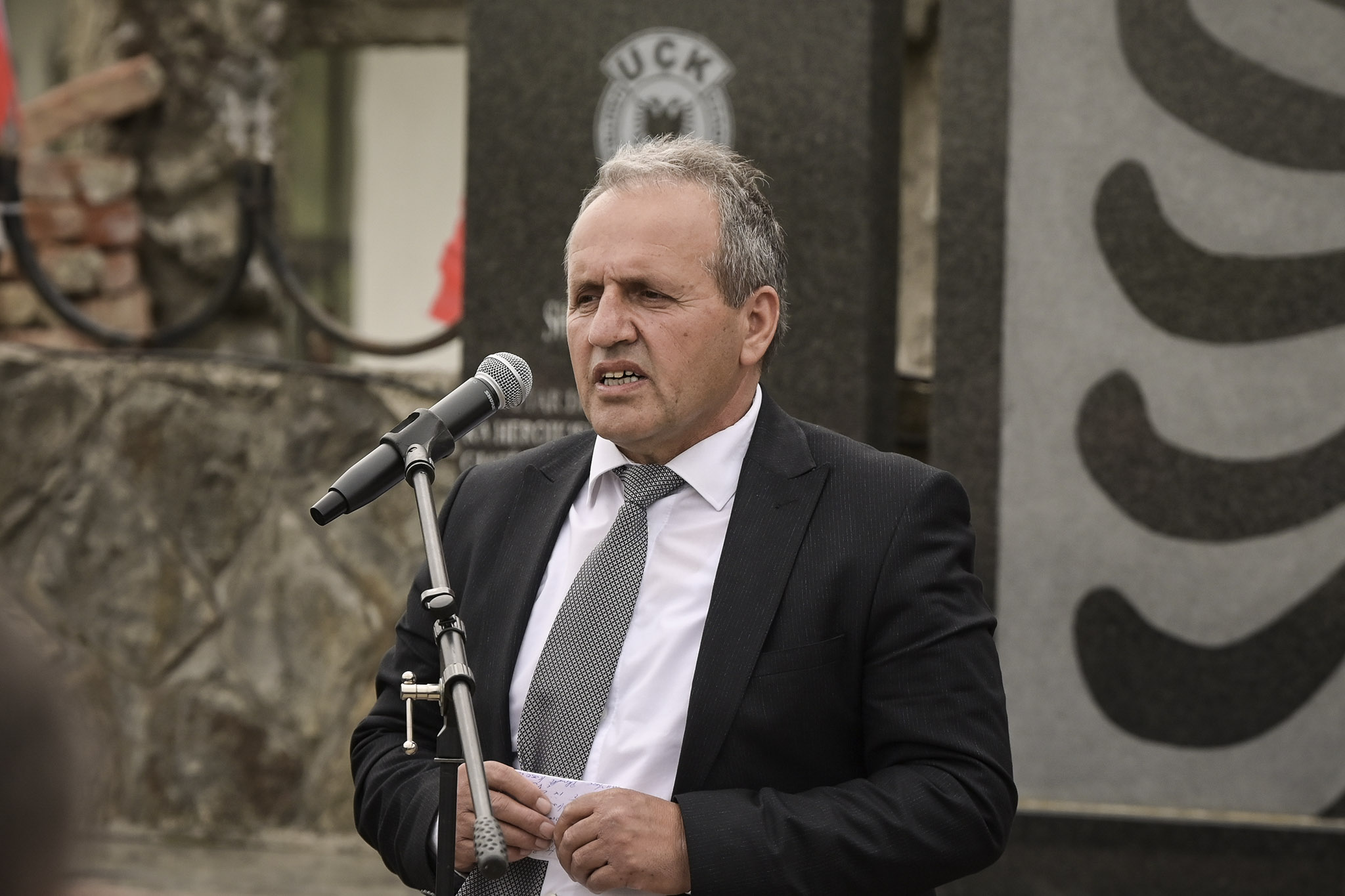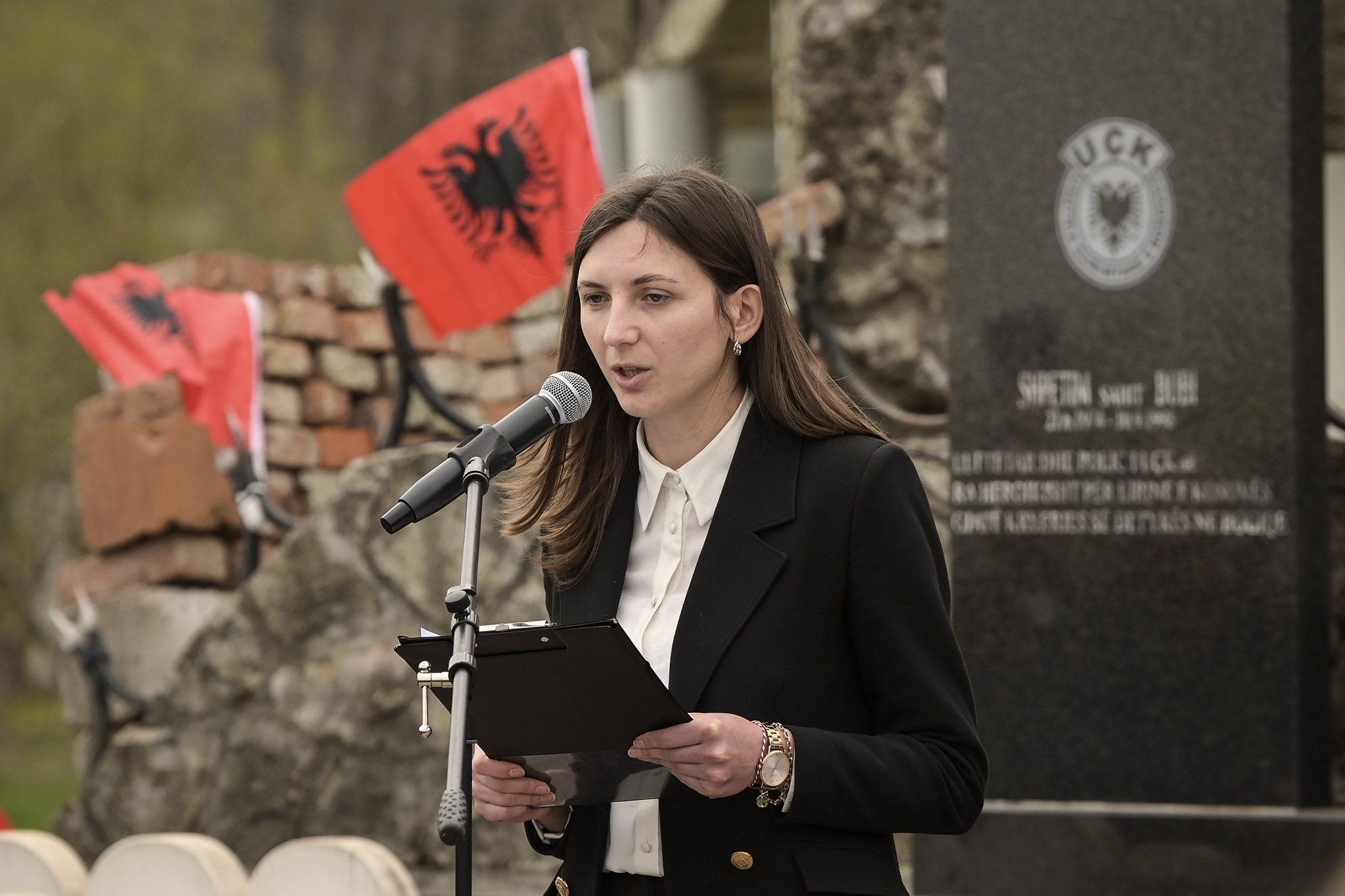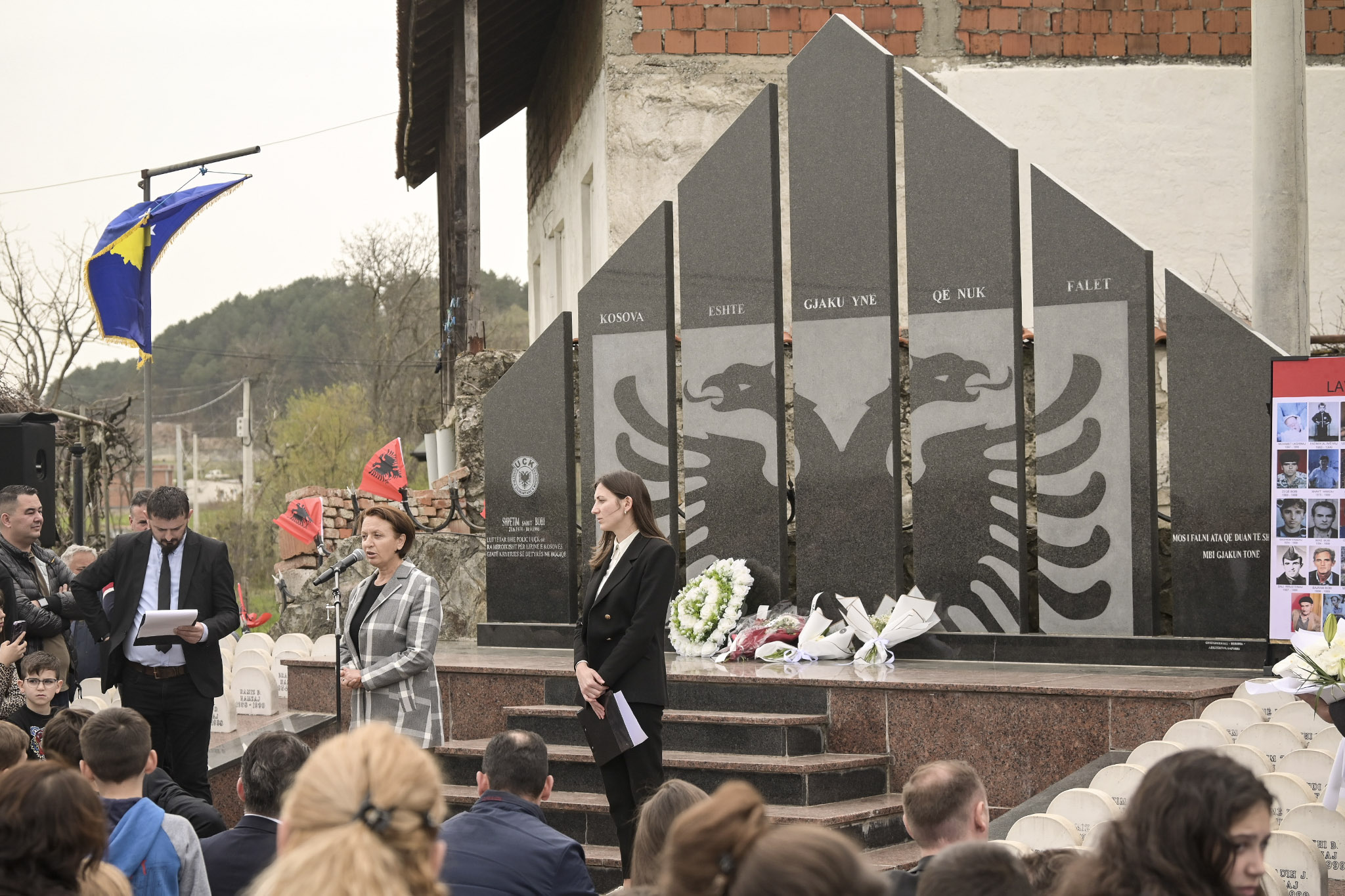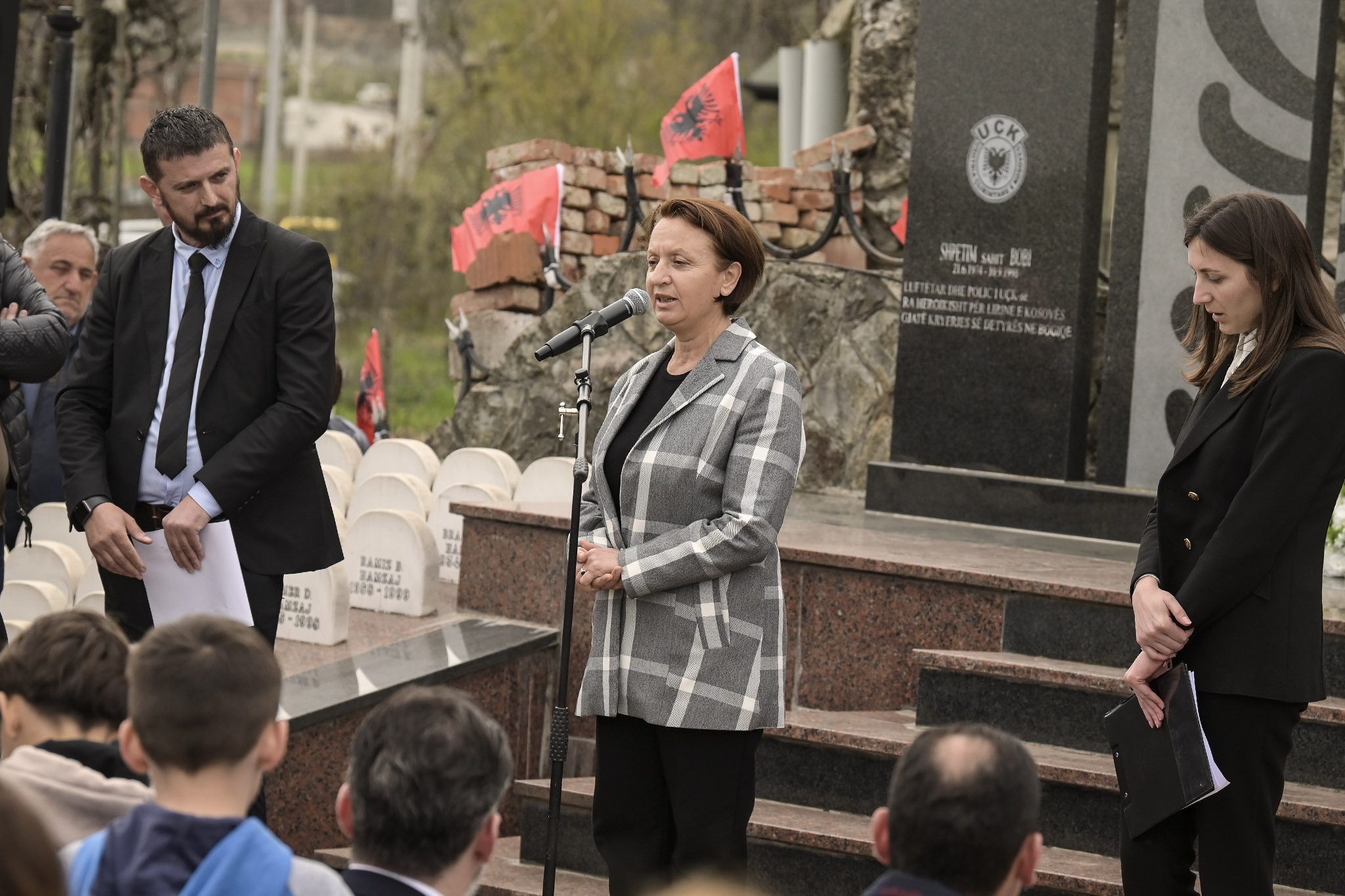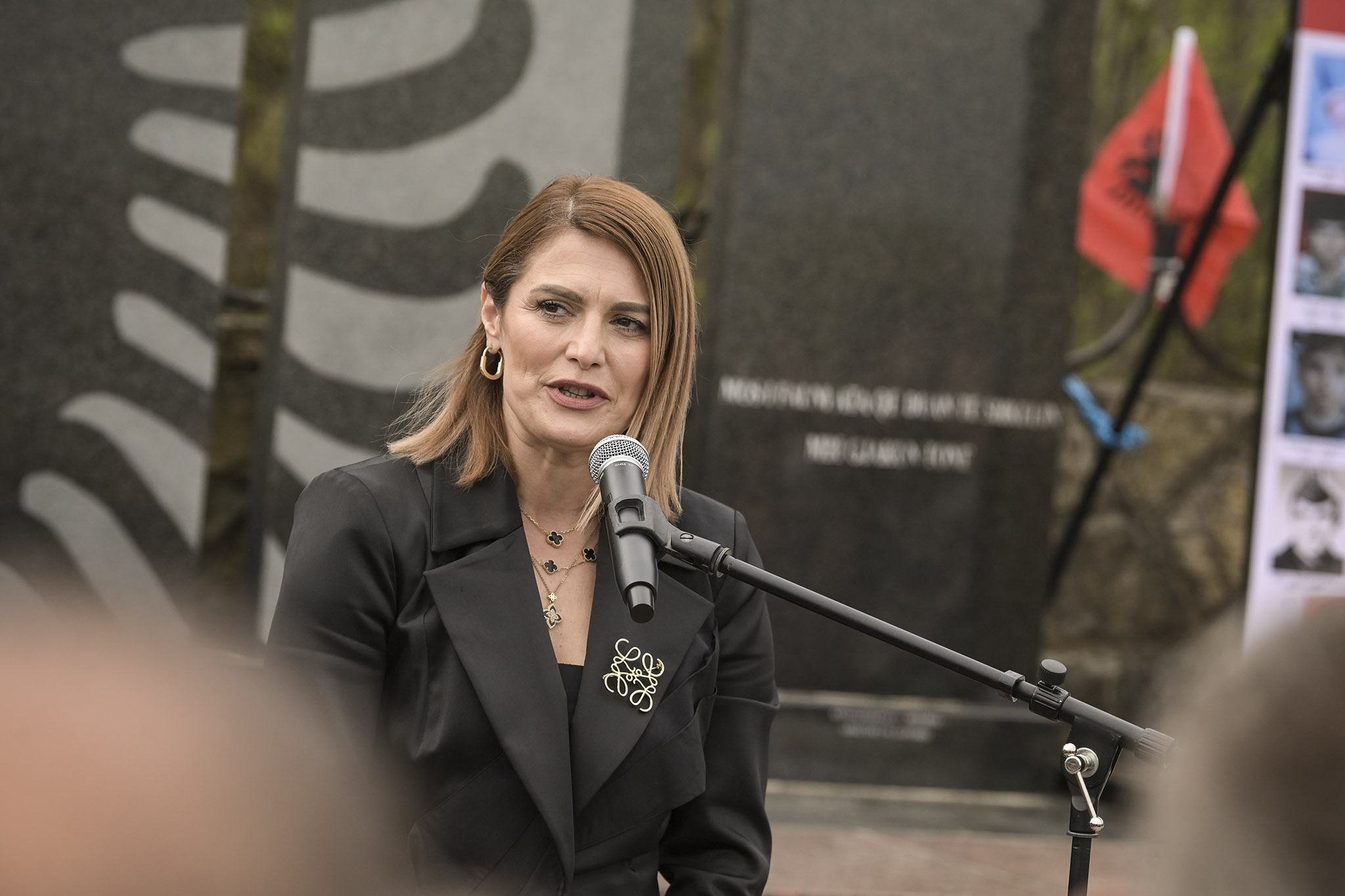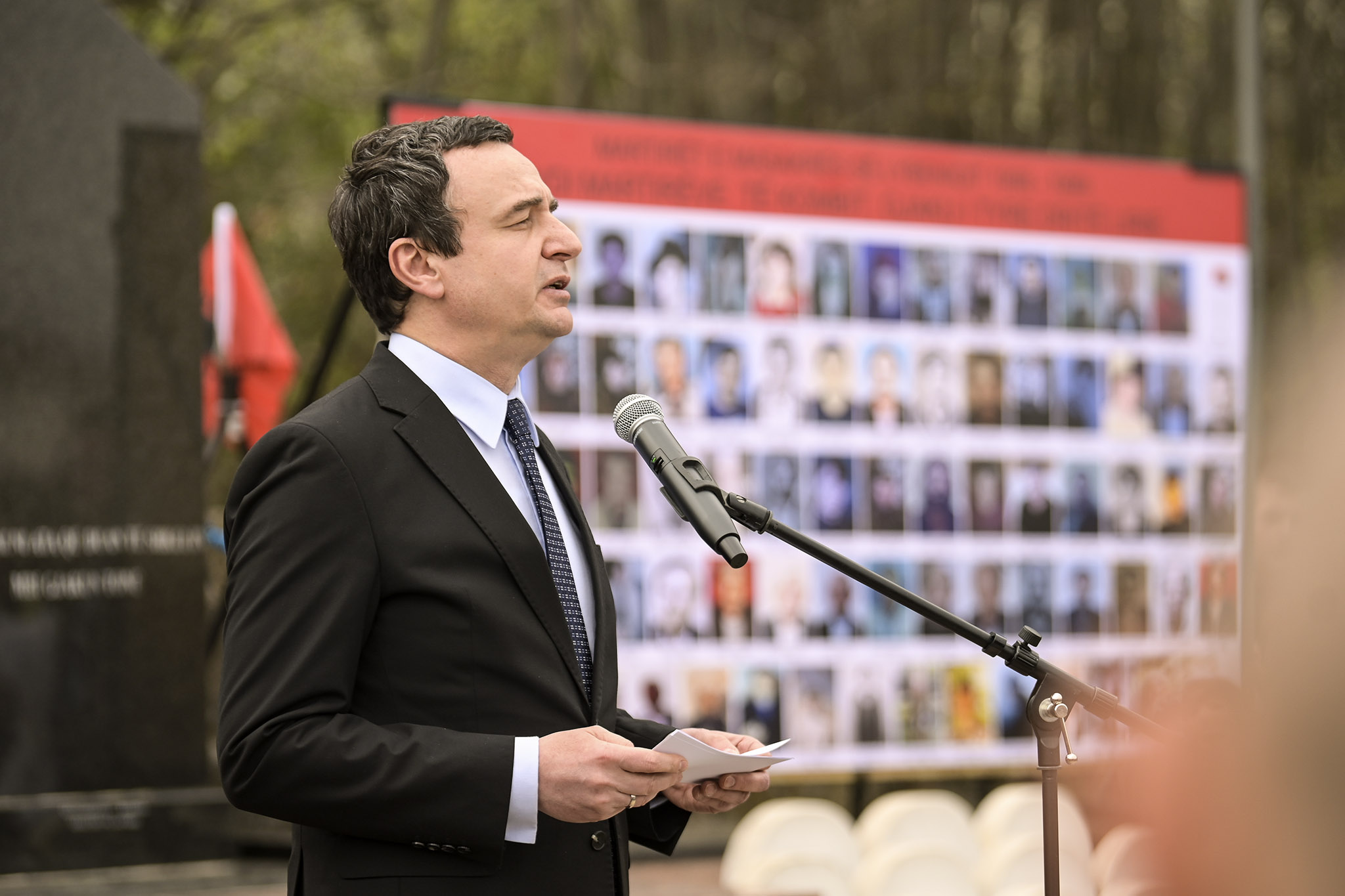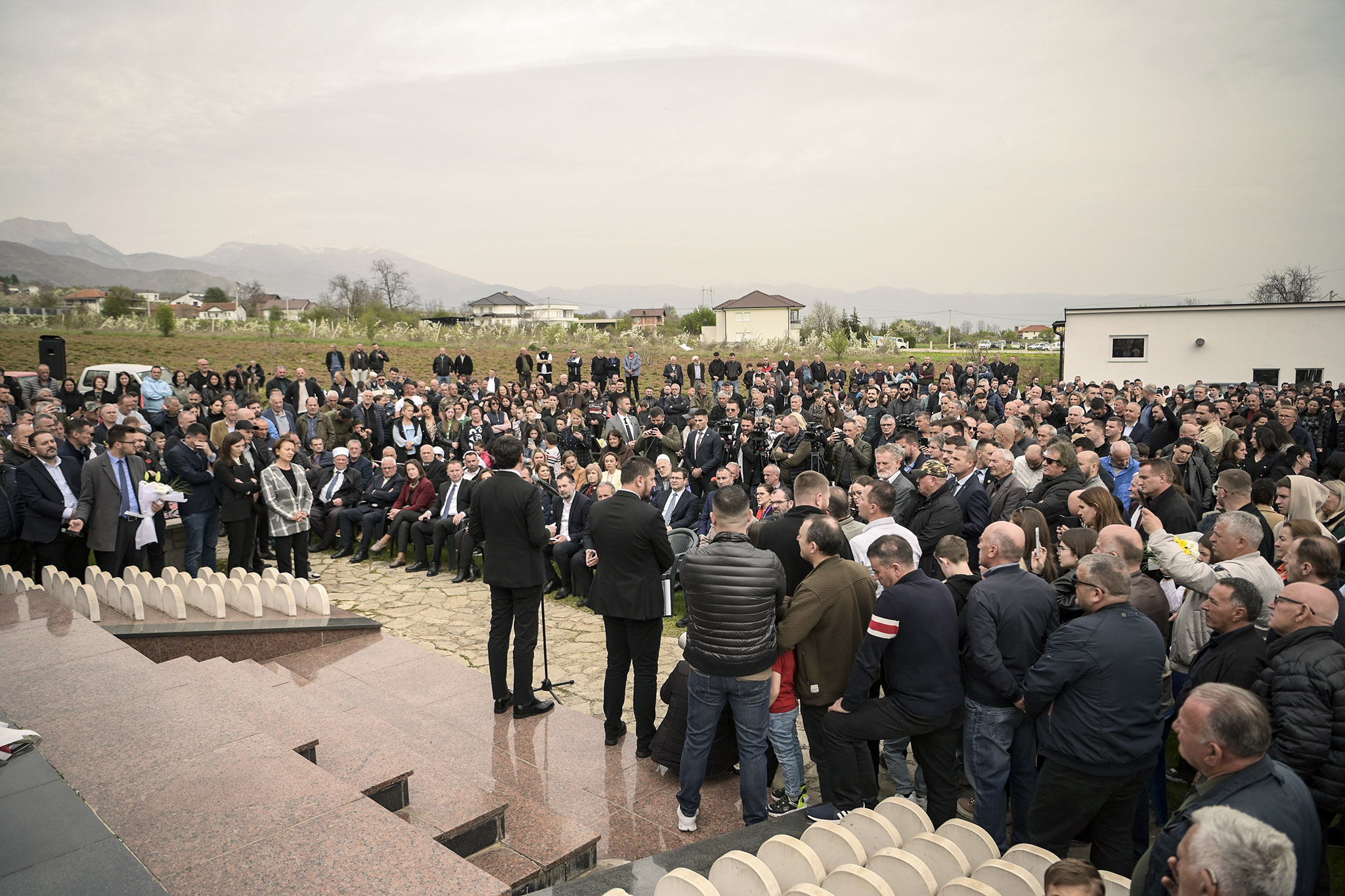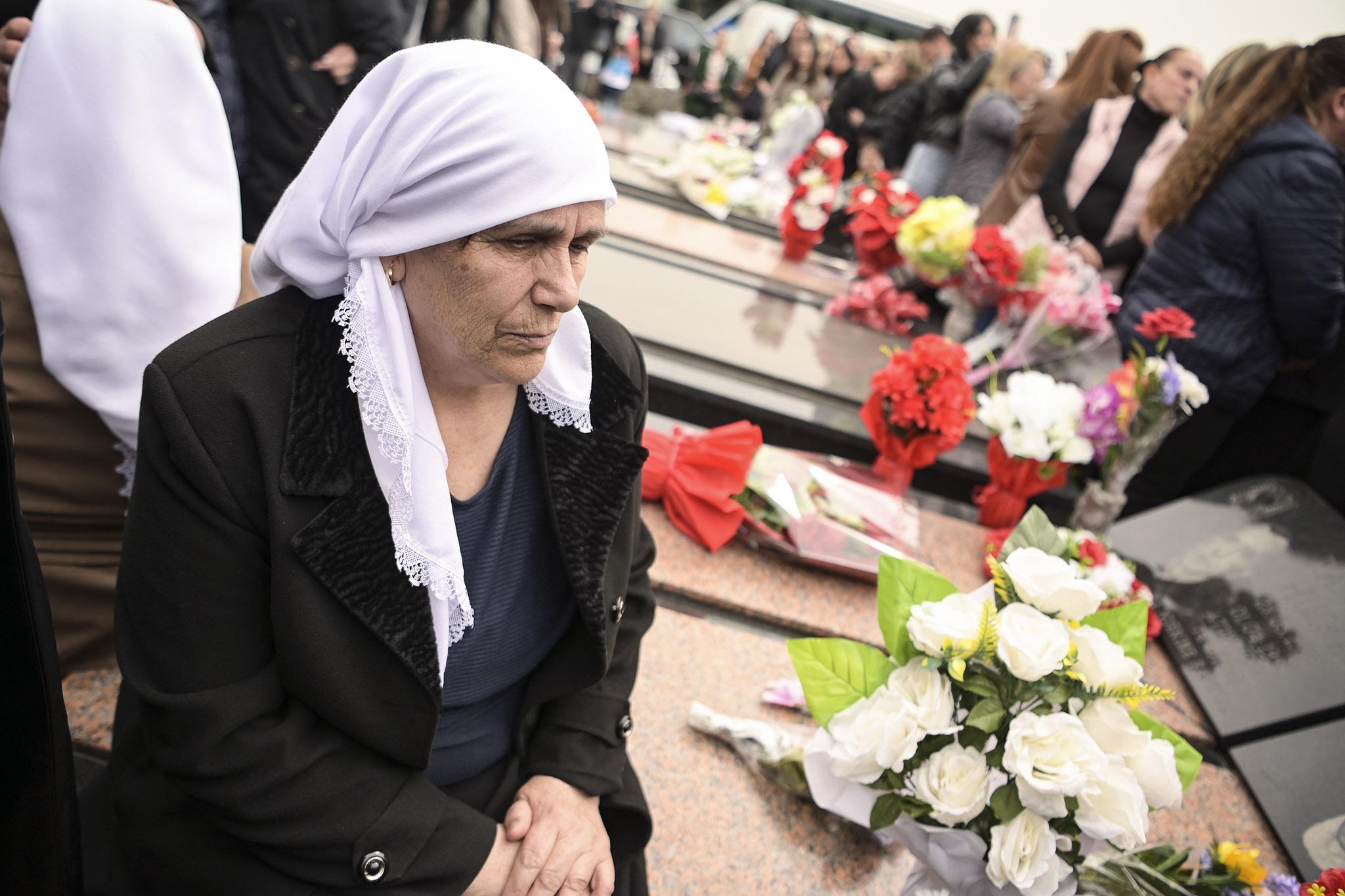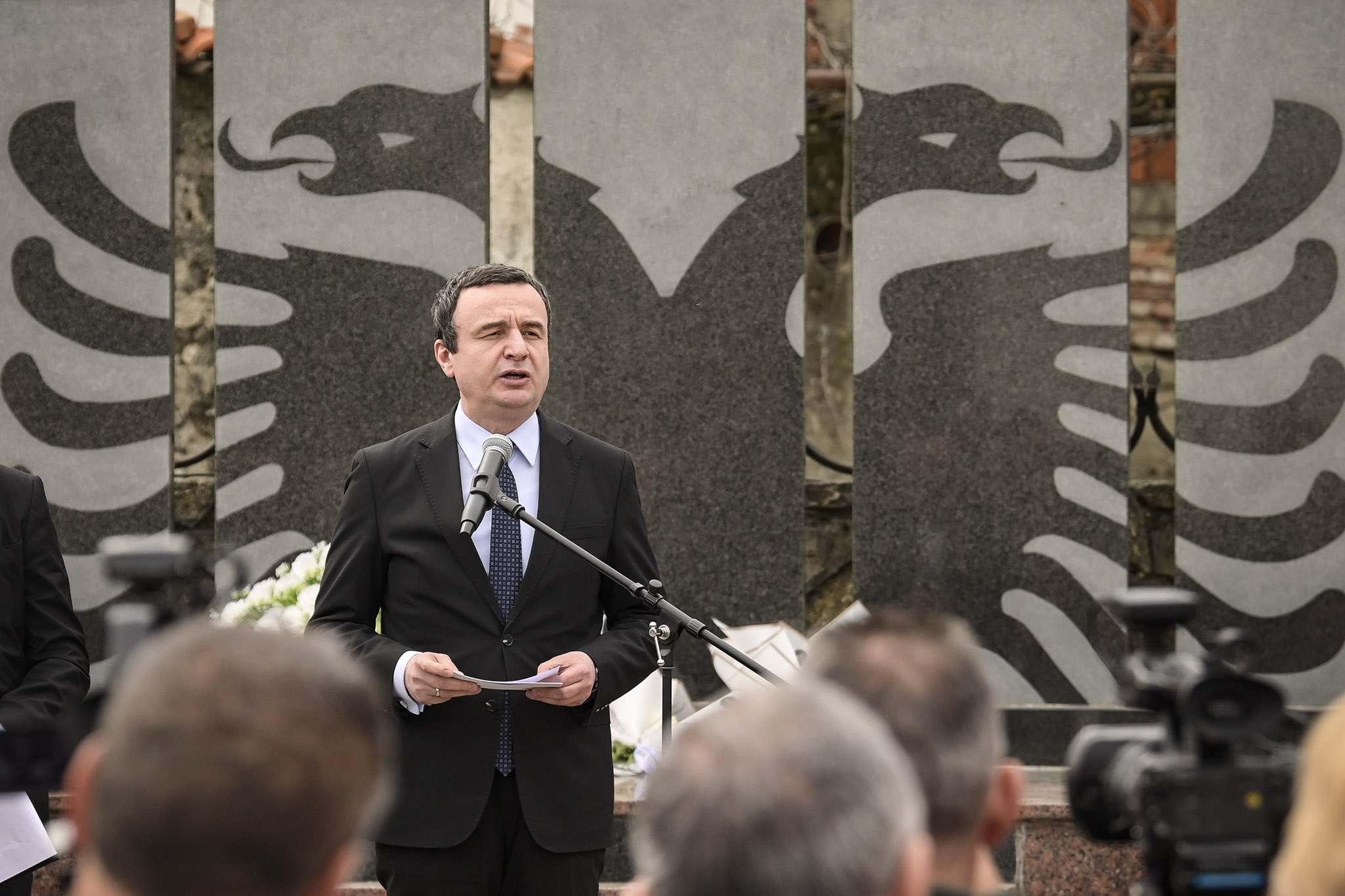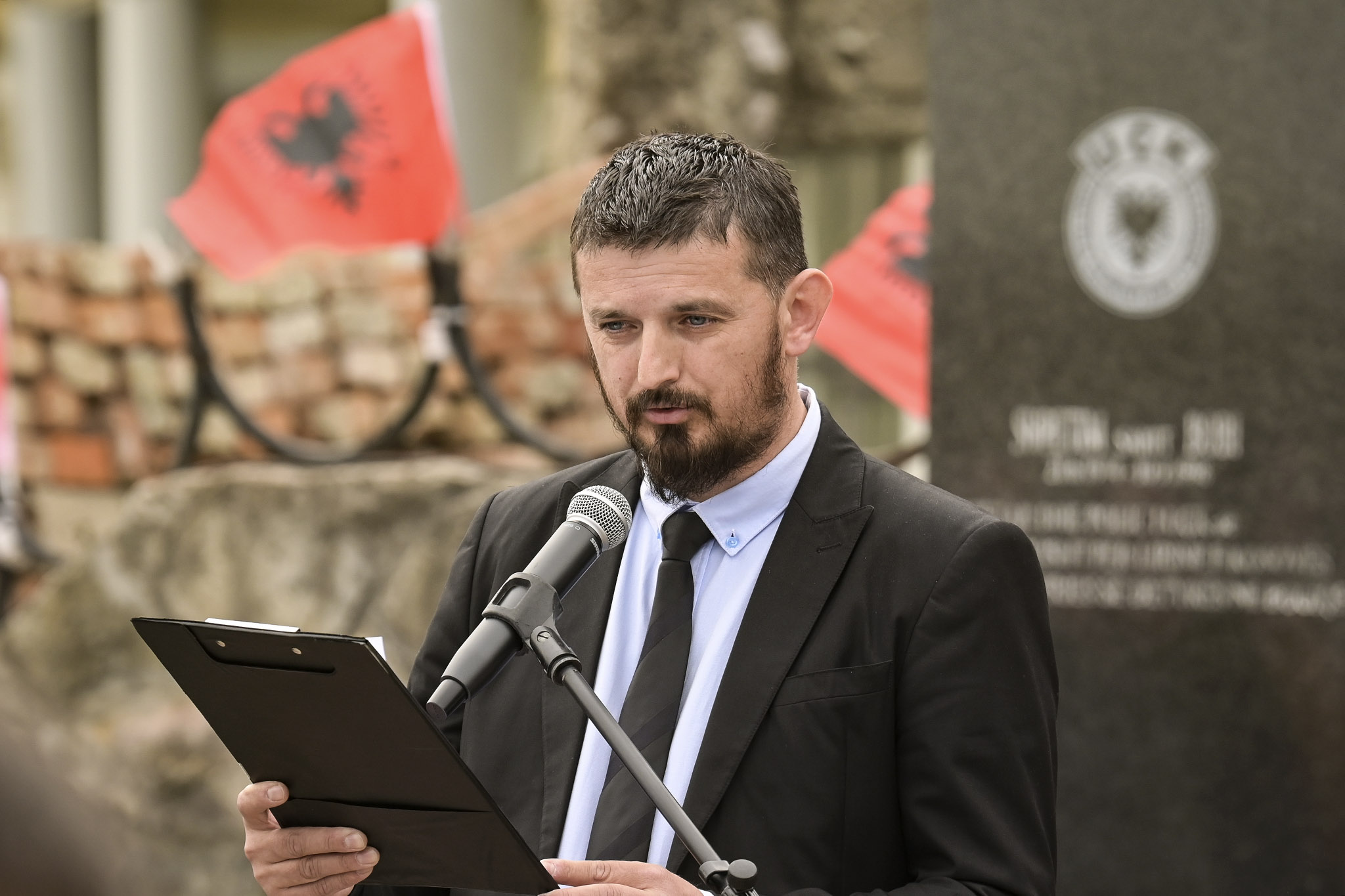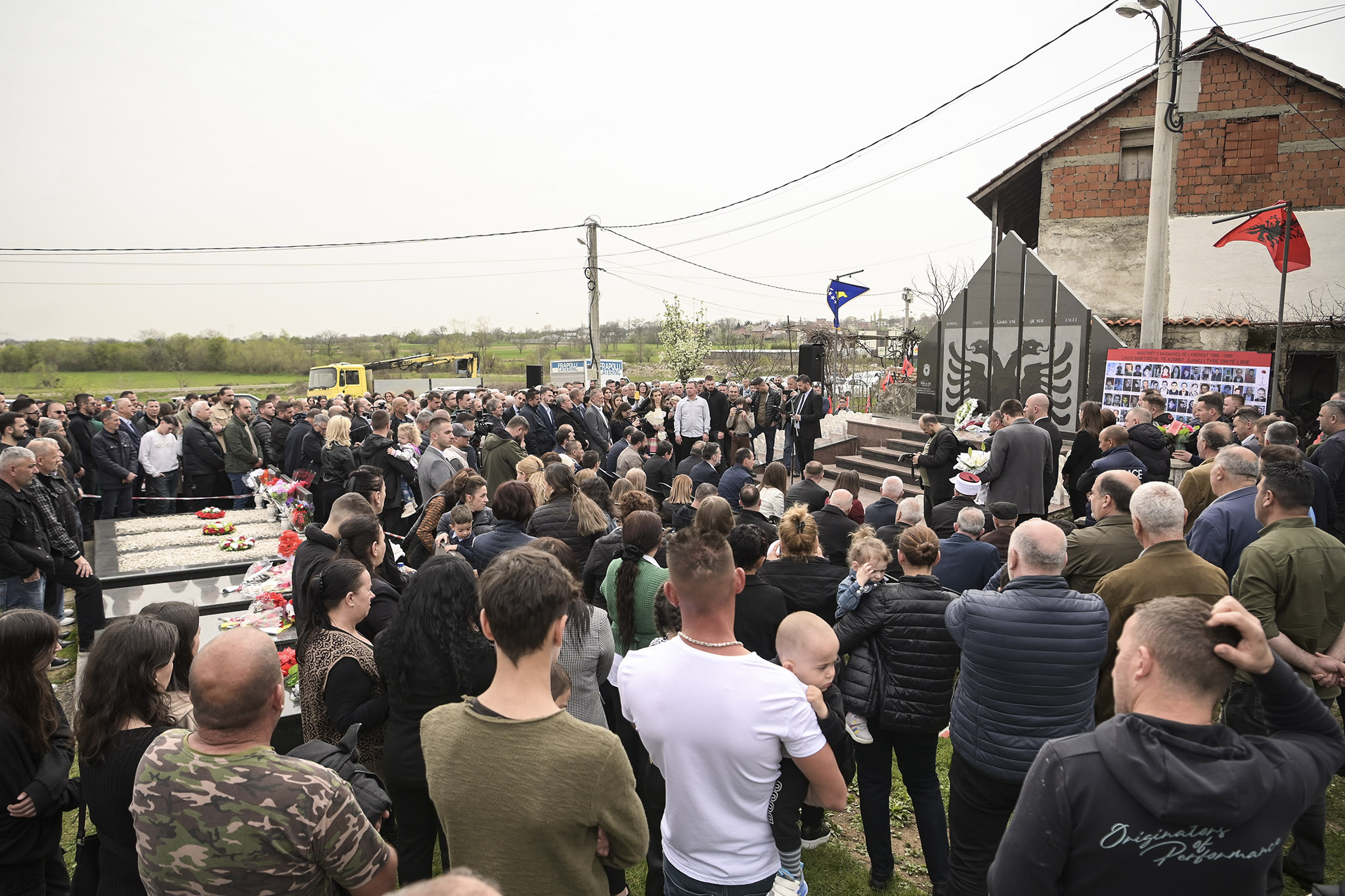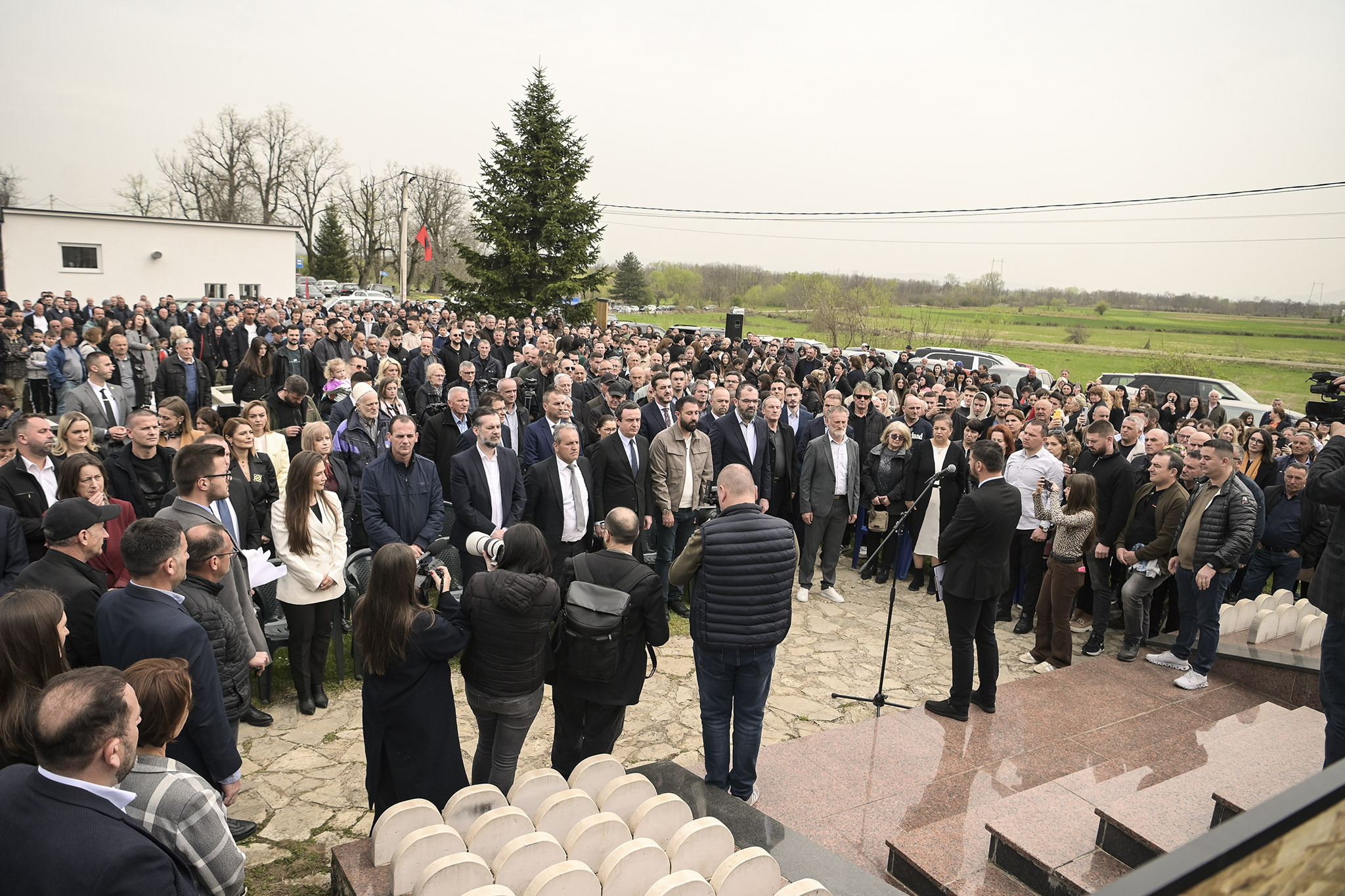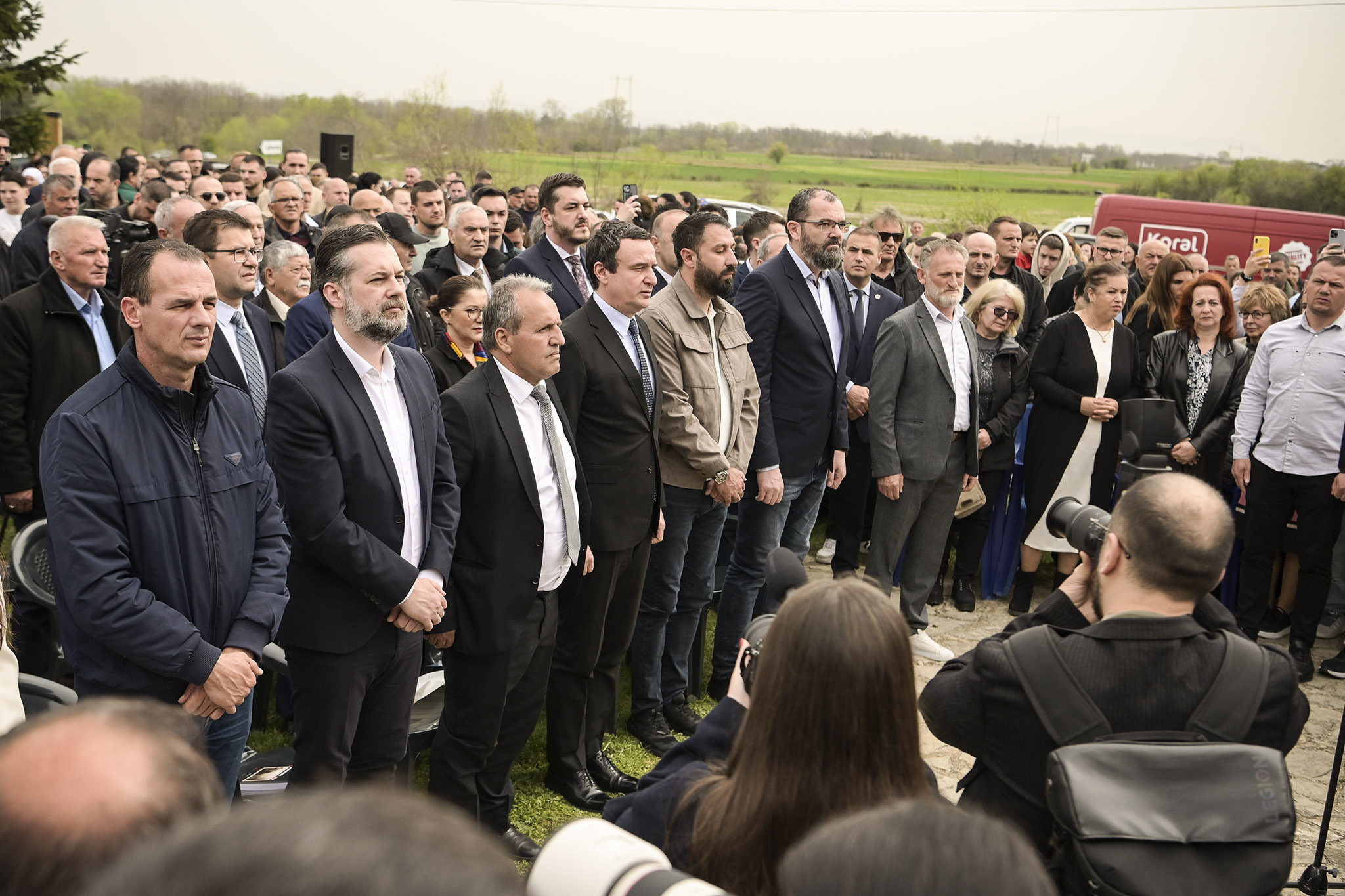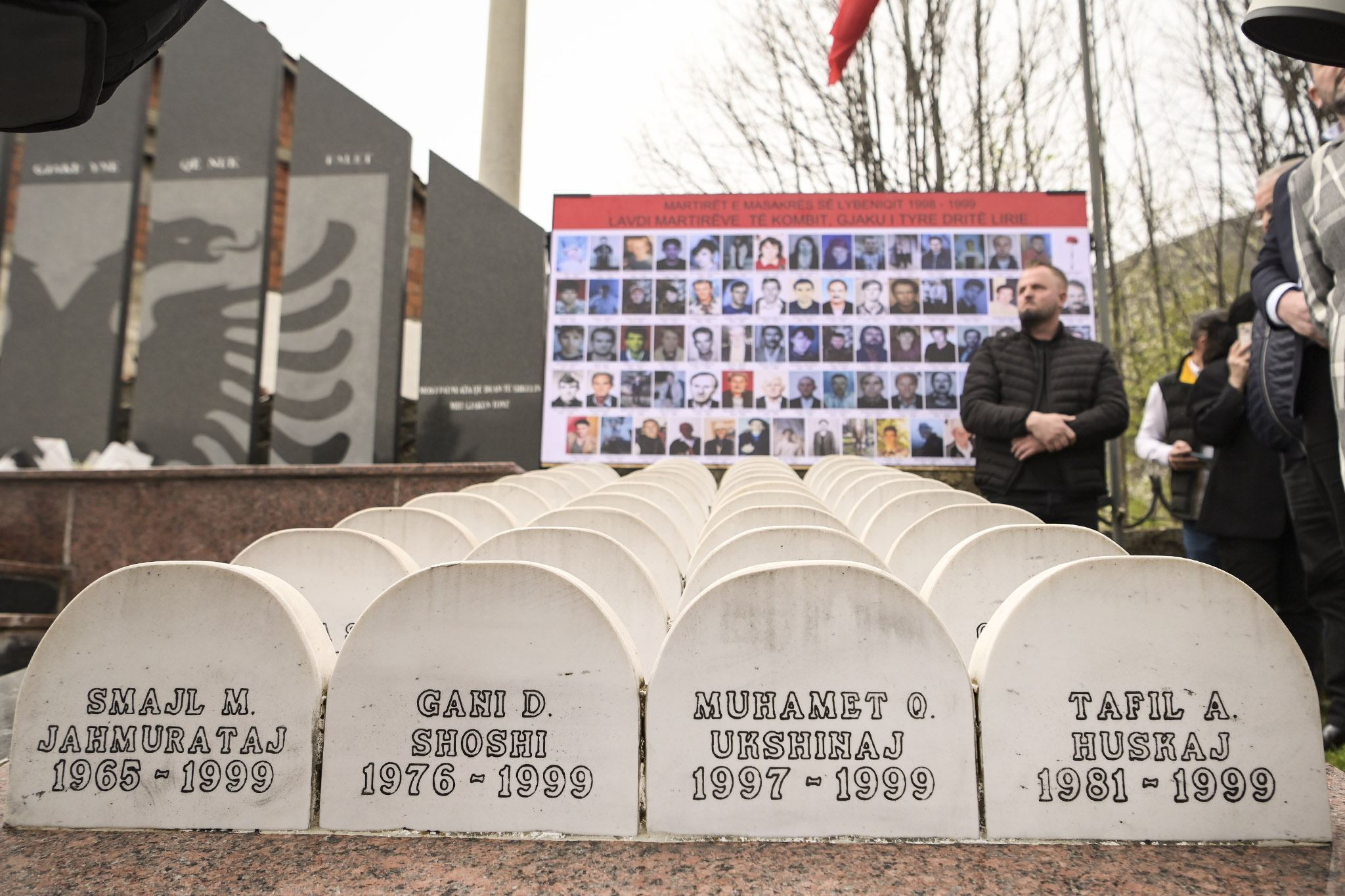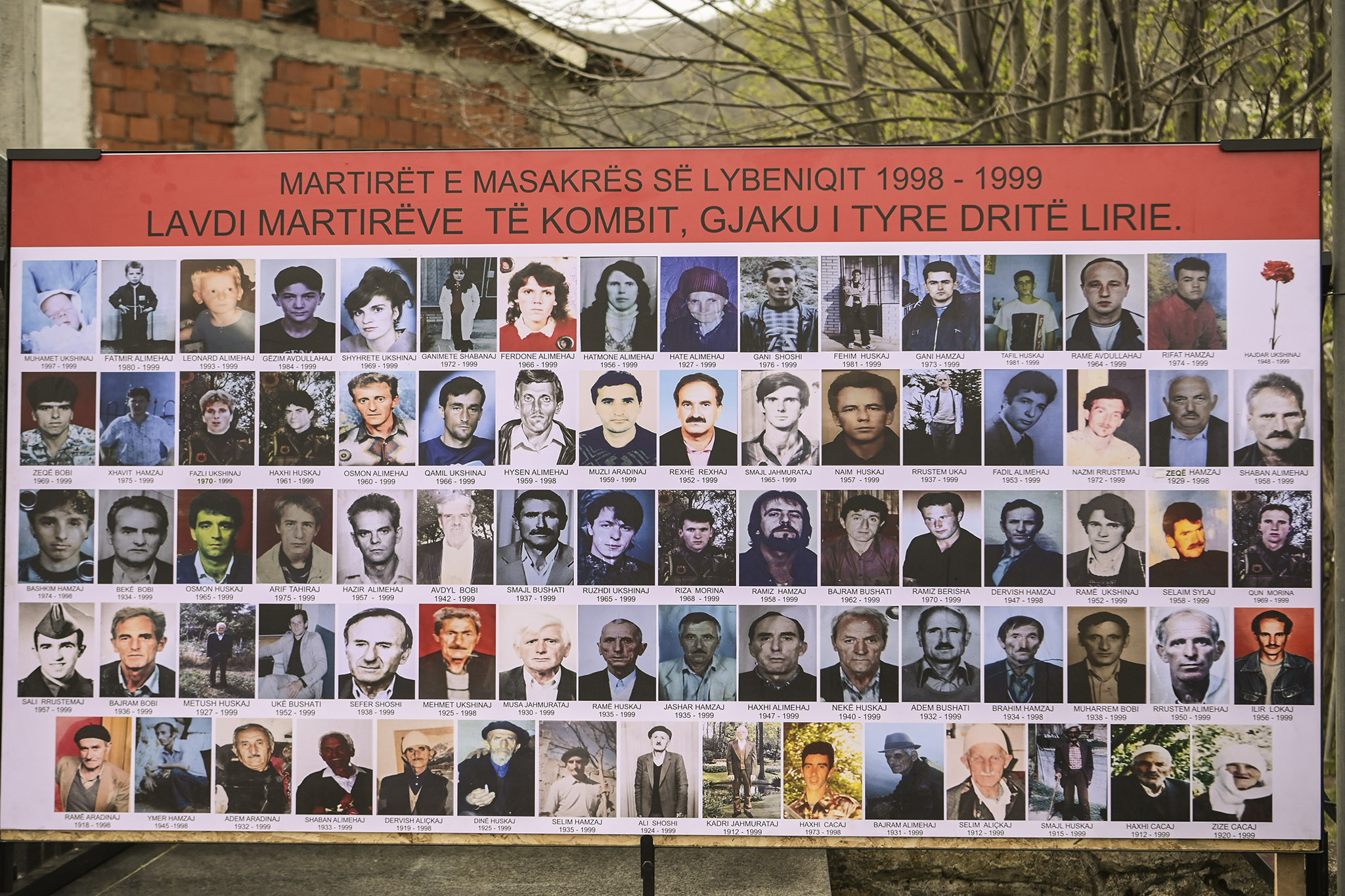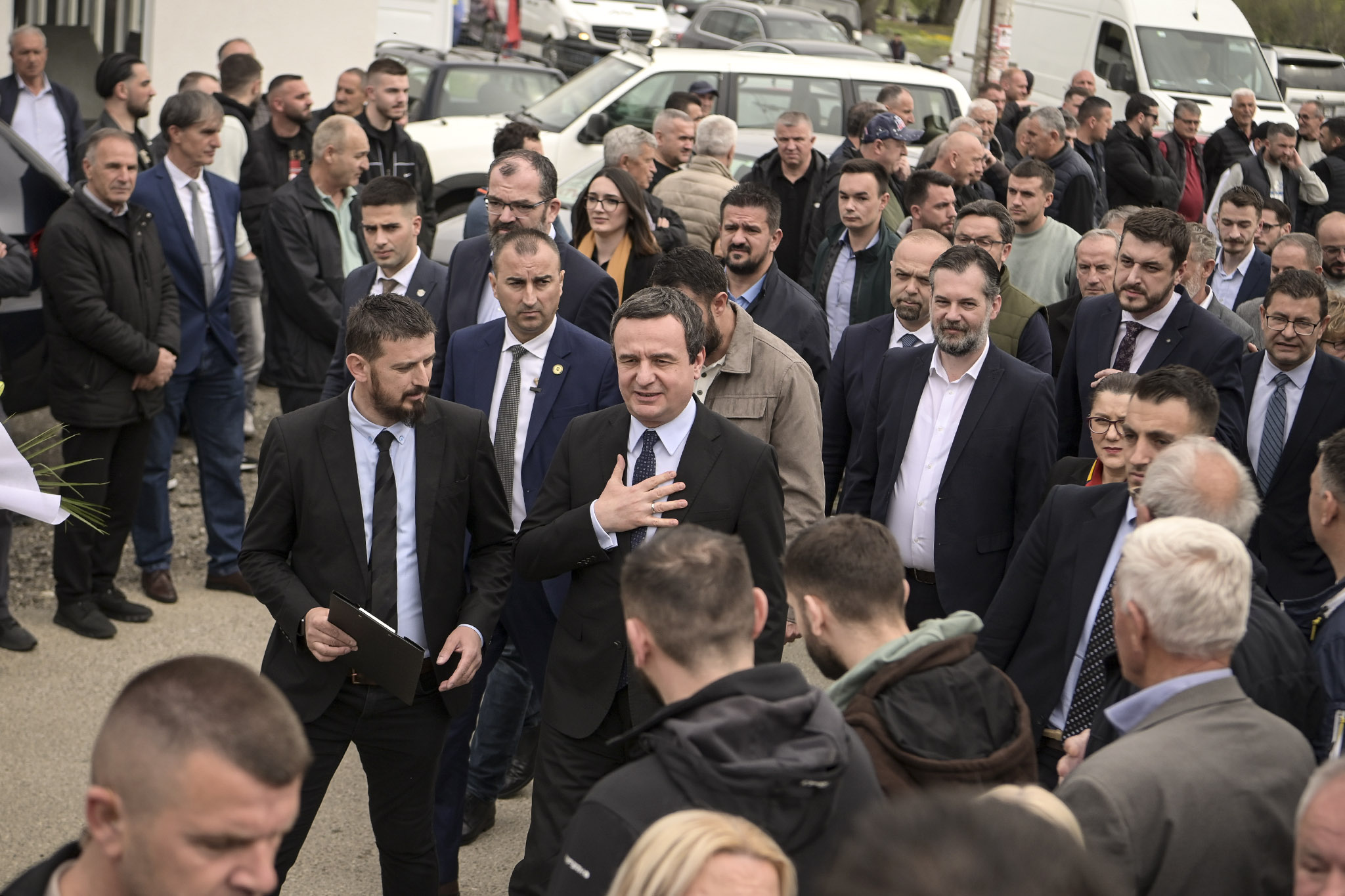Lybeniq, 1 April 2024
On the 25th anniversary of the Lybeniq massacre in Peja, The Prime Minister of the Republic of Kosovo, Albin Kurti, took part in the memorial gathering for the victims of this massacre committed bySerbian members of the “Çakejt” unit together with members of the Serbian Territorial Defense military unit.
Documented since 1999 by Human Rights Watch, Prime Minister Kurti stated that the Lybeniq massacre has evidence and witnesses, part of whom are the survivors of the massacre, the inhabitants of Lybeniq and the surrounding villages, who have seen and experienced the scenario of the crime of Serbian soldiers who separated women, children and the elderly, and ordered them to go to Albania, while the men were detained.
“The Lybeniq Mosque that day turned into a crime scene, when Serbian soldiers fired automatic weapons with repeated bursts, with the aim that none of those men would escape alive.” Under a tower of bodies, 7 men survived, while 59 family men were killed: Alimehaj, Ukshinaj, Huskaj, Hamzaj, Bobi, Shoshi, Morina, Jahmurataj, Avdullahaj, Bushati, Sylaj, Haradinaj, Rrustemaj, Lokaj, Rexhaj, Tahiraj and Berisha”, added Prime Minister Kurti.
“Peja’s Lybeniq was targeted by the criminal regime of Belgrade and was included in the geography of war crimes very early on, from 25 May 1998, when Serbian police killed nine men,” said Prime Minister Kurti during his speech. He also recalled the 7 April 1999 when Serbian soldiers killed ten members from the Alimehaj, Ukshinaj and Bobi families in the mountains of Lybeniq. Among them were two children, two and five years old, and a pregnant woman.
Prime Minister Kurti emphasized the advancement of the legal framework for addressing crimes committed during the war to enable the trial in absentia of war criminals. He also mentioned the allocation of resources for empowering the Special Prosecutor’s Office and the establishment of the War Crimes Investigation Directorate with 41 investigators within the Kosovo Police. Meanwhile, to accurately document all the crimes, the Institute of Crimes Committed During the War in Kosovo has been operationalized, for which 25 positions for experts and officers have already been opened.
Furthermore, reiterating that we are a society and a state that neither forgets nor forgives the crimes committed by Serbia in Kosovo, Prime Minister Kurti pledged that we will go all the way in this path because the state of Serbia and war criminals will not be able to escape institutional and individual responsibilities for the crimes and genocide committed against the Kosovo Albanians.
“The Government of the Republic of Kosovo and I personally, as its Prime Minister, have continuously encouraged and cooperated with many state institutions and mechanisms for the documentation, memorialization and addressing of the entire history and legacy of the war in Kosovo”, he concluded.
Prime Minister Kurti’s full speech:
Dear members of the Assembly of the Republic of Kosovo,
Honourable Ministers and Deputy Ministers of Government,
Dear Ministers Elbert Krasniqi and Hajrulla Çeku,
Dear representatives of international institutions,
Dear residents of Lybeniq,
Honourable Nezir Jahmurataj, mayor of Lybeniq village,
Dear war veterans of the Kosovo Liberation Army, war invalids, family members of heroes and martyrs,
Dear sisters and brothers,
Ladies and gentleman,
This year marks the 25th anniversary of the 1999 war, i.e. a quarter of a century of freedom. Here we are together in Lybeniq, 25 years from 1 April 1999, when the military and paramilitary forces of Serbia committed the massacre of Lybeniq, wherein they executed 59 men.
On that day, at 07:00 in the morning, members of the “Çakejt” unit part of “177” unit of the Yugoslav army in Peja, along with members of the Territorial Defense military unit, entered Lybeniq. Within minutes, they raided your homes and gathered almost all the residents of Lybeniq in the middle of the village, close to the mosque. According to the crime scenario, Serbian soldiers separated the women, children and elderly, ordering them to go to Albania, while the men were kept there.
The Lybeniq Mosque that day turned into a crime scene, when Serbian soldiers fired automatic weapons in repeated bursts, with the aim that none of those men would escape alive. Under a tower of bodies, 7 men survived, while 59 family men were killed: Alimehaj, Ukshinaj, Huskaj, Hamzaj, Bobi, Shoshi, Morina, Jahmurataj, Avdullahaj, Bushati, Sylaj, Haradinaj, Rrustemaj, Lokaj, Rexhaj, Tahiraj and Berisha.
Documented since 1999 by Human Rights Watch, the Lybeniq massacre has evidence and witnesses. First and foremost, the survivors of the massacre, you, the residents of Lybeniq and the surrounding villages, who have seen and experienced it.
The legal proceedings against the “Çakejt” unit members have been subject to statutory limitation and remanded from one to another court instance. This demonstrates the Serbian state’s strategy to obscure those cases, have trials just for show, while continuing to shelter and protect many war criminals.
To address the crimes committed during the war, we have developed the legal framework, which had been lacking for a long time, and we have strengthened the capacities of institutions to address them effectively. We have allocated resources to strengthen the Special Prosecution Office, namely for 4 Prosecutors, 6 Professional Associates and supporting staff positions, as well as new positions in general in the Kosovo Prosecutorial Council and the Kosovo Judicial Council. Prosecutors have good working conditions and receive high salaries.
There is a lack of judicial proceedings and discrepancies in data. Therefore, we have enabled trials in absentia for war criminals. Even as early as 2019. During this mandate, we have made the necessary legal amendments for Serbian war criminals to face justice because these crimes are neither forgiven nor forgotten. To accurately document all the crimes, we have operationalized the Institute for Crimes Committed During the War in Kosovo, for which 25 positions for experts and other officers have already been opened.
Therefore, we now have an address to submit all testimonies, and I hope that as many testimonies as possible about the crimes committed throughout Kosovo will be submitted. Meanwhile, to our justice system, I call once again for urgent addressing of cases of war crimes, because these crimes have never aged, but the witnesses are getting older.
19 police officers operating within the Serious Crimes Investigation sector of the Kosovo Police handled war crime cases in the past. With the new structure already approved in our country’s police force, we have established the War Crimes Investigation Directorate with 41 investigators, which represents an increase of more than 100 percent in the number of investigators. This is because there are far too many crimes and not enough investigators for all of them. Regarding the case of the Lybeniq massacre, police investigators submitted the draft of the criminal charges to the Special Prosecution Office in December of last year.
Dear residents of Lybeniq,
On the morning of 1 April 1999, the day when the massacre in Lybeniq took place, a Serbian soldier asked his victims: “Who burnt the houses nearby?”; and when Adem Haradinaj, a 67-year-old, responded that the houses were burnt by the police, the soldier took Adem and killed him by an automatic weapon. Following this, a 47-year-old man, Ukë Bushati, who dared to react to the soldier by saying, “You killed a man without letting him finish his sentence”, was shot by the same soldier, who replied: “Who are you to tell me who I am to kill?”.
Even 25 years later, the answer remains the same. We are the people and the state of Kosovo: witnesses, victims, survivors and successor of that dark history of the 90s when Serbia committed ethnic cleansing against native Albanians in Kosovo, committed war crimes, crimes against humanity and genocide!
We are a society and a state that neither forgets nor forgives the crimes committed by Serbia in Kosovo. We are a people ready to testify; we are a Republic that day by day is completing its institutional and legal infrastructure to address war crimes. The Government of the Republic of Kosovo and I personally, as its Prime Minister, have therefore continuously encouraged and cooperated with many state institutions and mechanisms for the documentation, memorialization and addressing of the entire history and legacy of the war in Kosovo. We are committed to go all the way on this path because the state of Serbia and war criminals will not escape institutional and individual responsibilities for the crimes and genocide committed against us, the Kosovo Albanians.
Just as they acted in Lybeniq, on 7 April 1999, Serbian soldiers killed in the hills of Lybeniq at the “Stani i kërrshit” 10 members from the families Alimehaj, Ukshinaj and Bobi. Two children, aged 2 and 5, and a pregnant woman were among them. Lybeniq of Peja was targeted by the criminal regime of Belgrade and was included in the geography of war crimes long ago, since 25 May 1998, when Serbian police killed nine men.
Serbia continues to evade its responsibility as a state for the crimes in Kosovo. Our democratic Republic, our independent state, is making significant progress on its path of social and economic progress. We are a parliamentary, democratic republic that respects human rights and aims to join the European Union and NATO. We continue to look forward while honouring our past, never forgetting where we come from and who enabled us to be here, to live in freedom and enjoy the state. Therefore, even here today in Lybeniq, to remember your loved ones, our loved ones, we have come together to pledge to address the war crimes at the addresses of the war criminals, their accomplices and instigators and bring them before justice and history.
May the memory of those killed in the Lybeniq massacres be eternal, and glory to all the fallen, martyrs and heroes on the path we have made to our freedom!
Thank you.
Last modified: April 19, 2024
